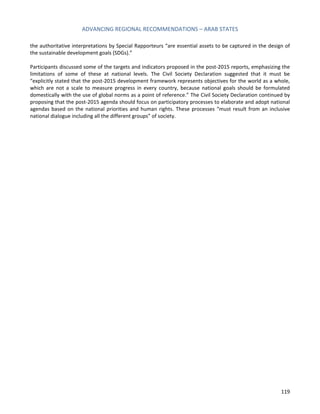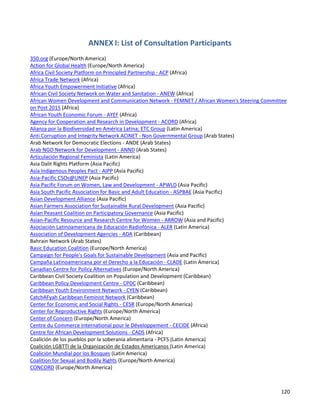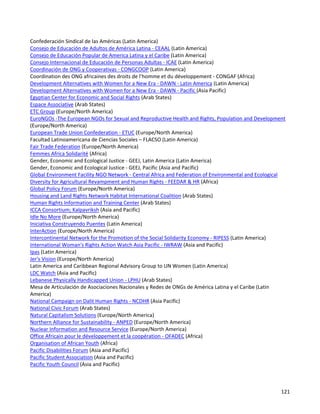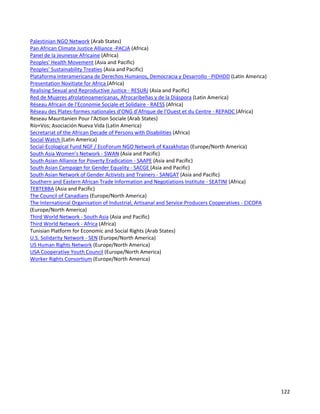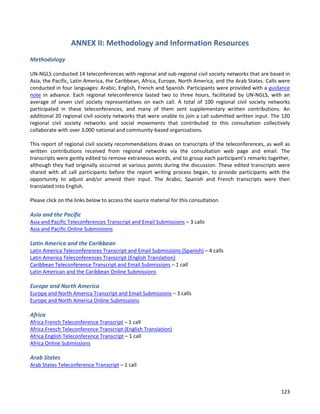This document summarizes recommendations from regional civil society networks regarding the UN post-2015 development agenda. It identifies four main objectives that surfaced from the inputs:
1. Rebalance power relations for justice by transforming economies to fulfill human rights and well-being, adopting redistributive policies, and redirecting military funds to development.
2. Fulfill human rights and overcome exclusion by adopting a rights-based approach and ensuring rights to education, health, work, and protection for marginalized groups.
3. Ensure equitable distribution and safe use of natural resources by promoting sufficiency over efficiency, sustainable consumption models, renewable energy, climate justice, and adequate climate financing.
4. Establish participatory governance,
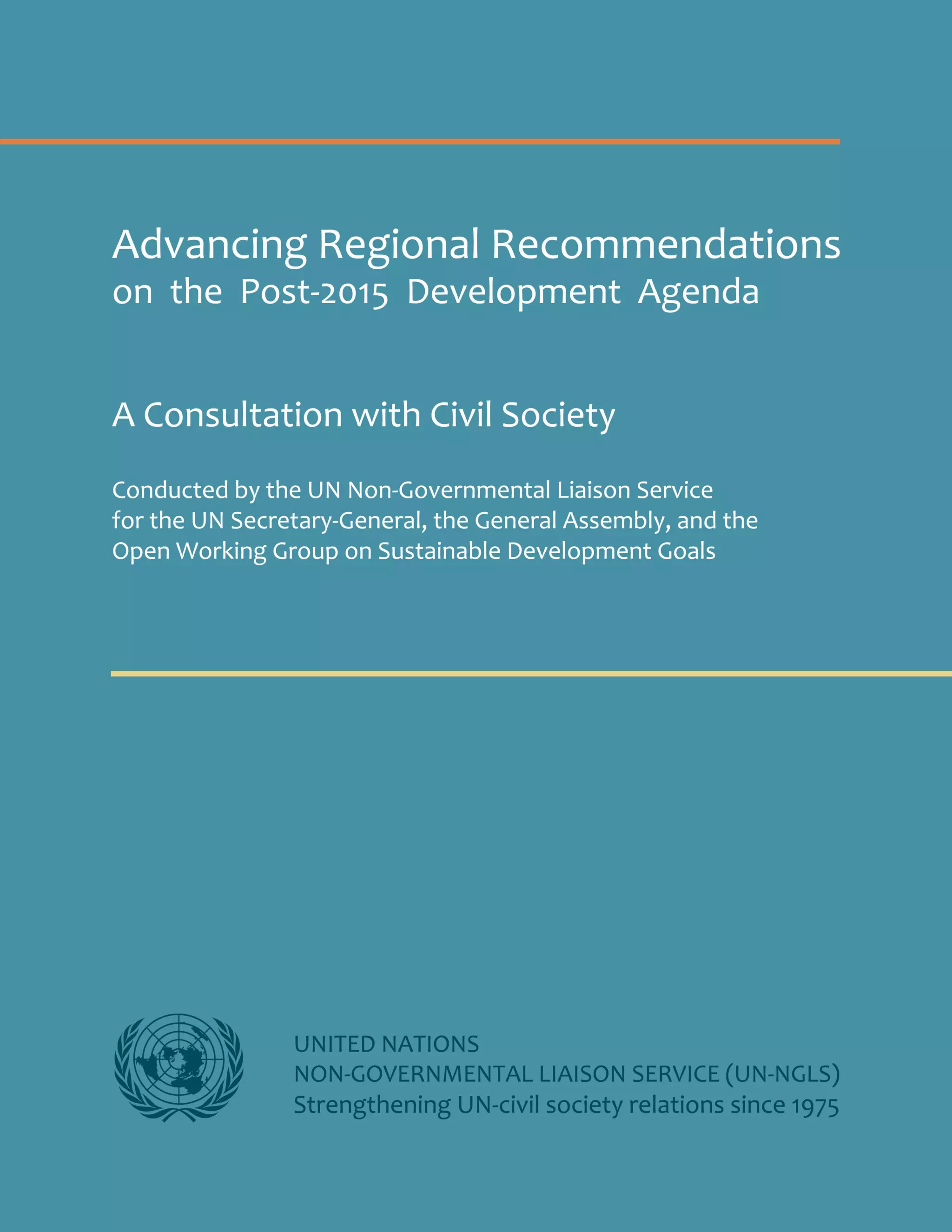
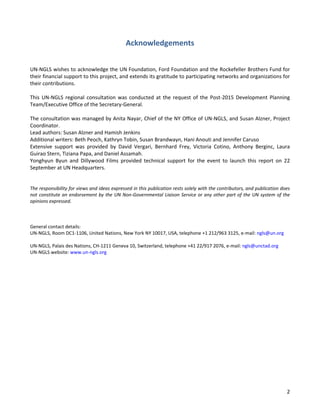
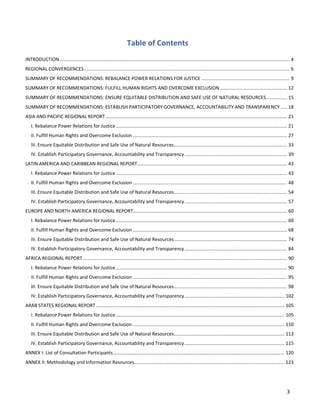
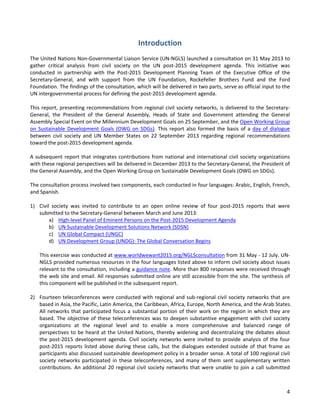
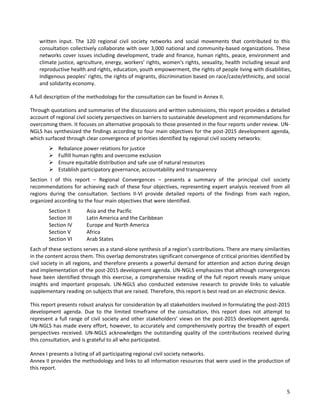
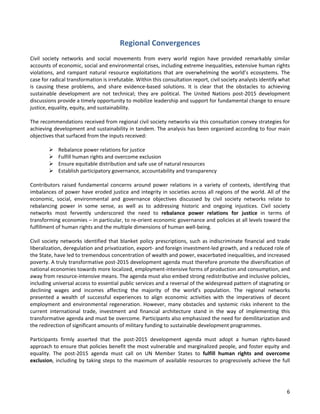
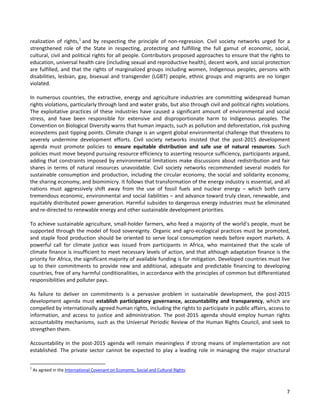
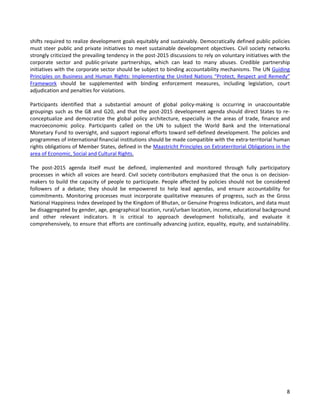
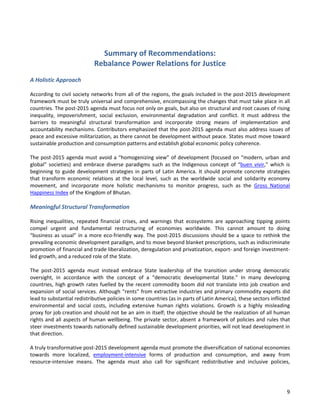
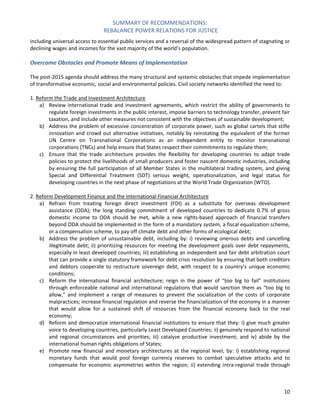
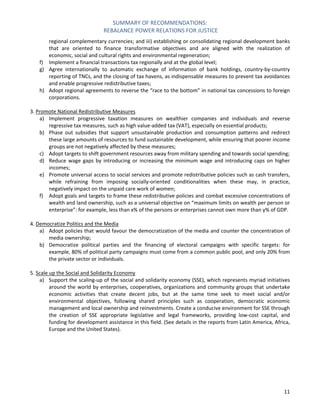
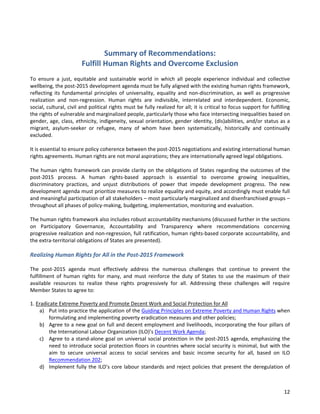
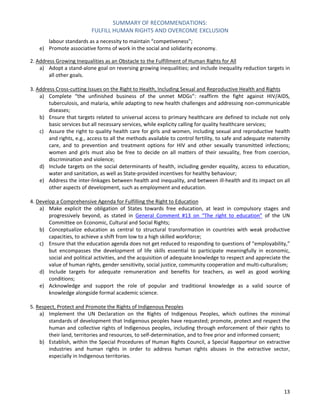
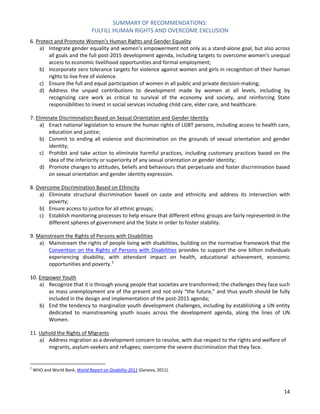
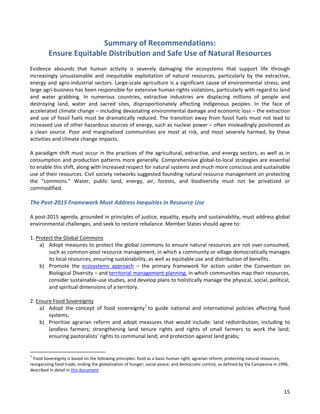
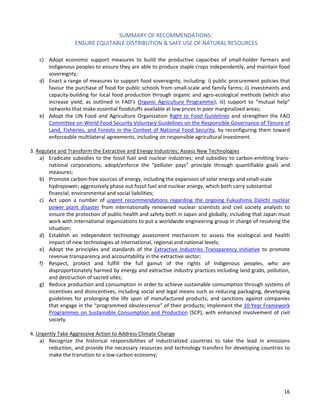
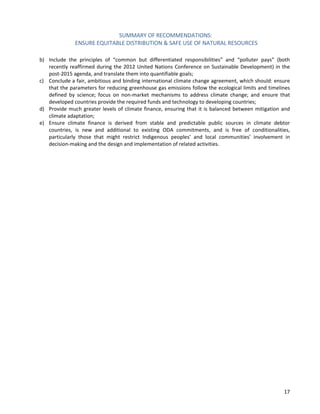
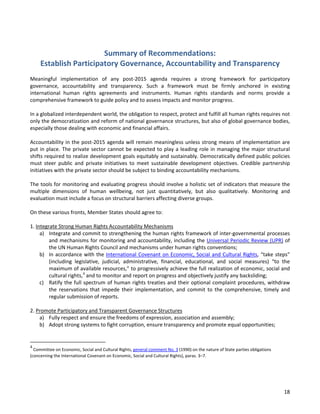
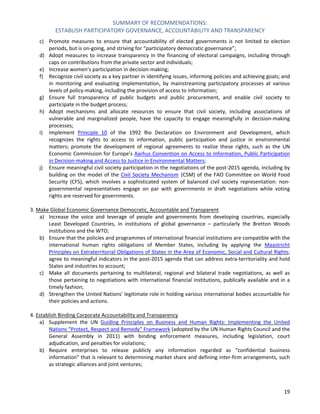
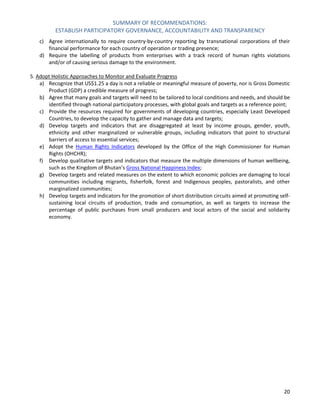
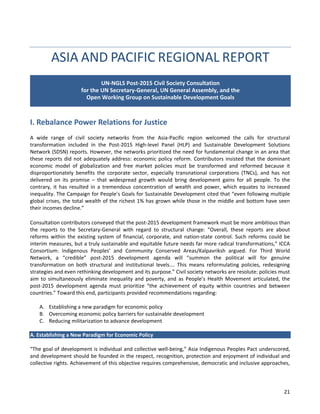
![ADVANCING REGIONAL RECOMMENDATIONS - ASIA AND PACIFIC
22
as well as accountability. It must involve decentralized decision-making, so that people can achieve well-being according to their own needs and values, contributors stressed. It is aided by policies and investments that
grow the real economy of manufacturing and services within ecological limits. Rural and urban communities and producer groups must have a central say in the economy.
These approaches are divergent from the dominant economic model, which emphasizes privatization, liberalization and financialization5 of the economy and relies on growth and the corporate sector to drive change and stimulate investments. Civil society networks asserted that the post-2015 development agenda must prioritize the real economy over the financial economy, pursue holistic and equitable development objectives, reassert the role of strong public finance, and promote regulation of the corporate sector – including measures to control corporate concentration.
Prioritize the Real Economy Over the Financial Economy
As Third World Network explained, financial deregulation and liberalization have paved the way for international finance to create an economy of its own – an economy that has become increasingly disconnected from the activities of production and investment in job creation and wage growth. The impacts of this financialization, according to Third World Network, include volatile commodity and food prices, rapid shifts in exchange rates and speculative boom-bust cycles that have led to chronic financial crises and economic recessions with devastating effects on development, equality and rights.
Participants referred to a comprehensive study produced by the International Labour Organization (ILO) in 2013, which found that “financialization stands as the single most adverse factor in terms of explaining the decline of labour income shares” in both developed and developing economies.6 The ILO explains the reason for this: “The switch in the 1980s to corporate governance systems based on maximizing shareholder value and the rise of aggressive returns-oriented institutions, including private equity funds, hedge funds and institutional investors, put pressure on firms to increase profits, especially in the short term.”7 Since the 2007- 08 financial crisis, these banking and financial sectors responsible for instigating the credit and asset bubbles that led to the crisis remain essentially unreformed. The post-2015 development framework needs to address the financialization of the economy by reviving a focus on strategic government policies, tailored to local conditions, that allow for a sustained shift of resources from the financial economy back to the real economy.
Pursue Holistic and Equitable Development Objectives
Many contributors were concerned that proposed policies and goals aimed at stimulating economic growth may undermine policies and goals on social and environmental issues. As expressed by the Campaign for People’s Goals for Sustainable Development, growth-led development “does not create jobs, depletes natural resources, and intensifies inequality.” Asia-Pacific CSOs@UNEP contributed, ”Recognizing that the current economic model which promotes unsustainable consumption and production patterns, facilitates a grossly inequitable trading system, fails to eradicate poverty, assists [the] exploitation of natural resources toward the
5 Financialization is most commonly defined as “the increasing role of financial motives, financial actors and financial institutions in the operation of domestic and international economies.” Source: Epstein, G. (ed.). 2005. Financialization and the world economy (Cheltenham, Edward Elgar Publishing), also cited by the International Labour Organization in its 2012/2013 Global Wage Report.
6 International Labour Organization, Global Wage Report 2012/13: Wages and Equitable Growth, pp. 51-53.
7 Ibid. p. 51.](https://image.slidesharecdn.com/advancingregionalrecommendationsonthepost2015developmentagenda1-141205215235-conversion-gate02/85/Advancing-regional-recommendations-on-the-post-2015-development-agenda-1-22-320.jpg)
![ADVANCING REGIONAL RECOMMENDATIONS - ASIA AND PACIFIC
23
verge of extinction, and has induced multiple crises on Earth, [it] needs to be replaced by sustainable economies in community, local, national, regional and international spheres.”8
Consultation participants cited examples of “Indigenous development vision,” the Kingdom of Bhutan’s Gross National Happiness Index, and the civil society “Development Justice” framework, as embodying the ideals of holistic and participatory approaches, and advocated for their wider implementation in development efforts. Asia Indigenous Peoples Pact explained that Indigenous development vision is based on ten interdependent and indivisible aspects: culture; social system; spirituality; politics and institutions; judicial system; education, including all ways of learning; economy; natural resource management; technology and innovation; and health. South Asia Women’s Network (SWAN) advocated for the post-2015 development agenda to promote the Gross National Happiness Index, which is based on nine “domains”: psychological well-being; health; time use; education; cultural diversity and resilience; good governance; community vitality; ecological diversity and resilience; and living standards. This approach “integrates inclusive economic development with strengthening communities, protecting the environment, providing universal access to health services and education, and preserving traditional culture and heritage.”9 Asia Pacific Forum on Women, Law and Development (APWLD) pointed to the “Development Justice” model, described in the August 2013 Bangkok Civil Society Declaration and endorsed by 116 Asia and Pacific civil society organizations: a “transformative and redistributive framework that aims to reduce inequalities of wealth, power and resources between countries, between rich and poor and between men and women.” Development Justice should be framed by five foundational shifts: Redistributive Justice, Economic Justice, Social Justice, Environmental Justice and Accountability to Peoples.10 The Bangkok Civil Society Declaration describes in detail how these shifts should be achieved.
Promote Regulation of the Corporate Sector
Many organizations are concerned that the HLP, SDSN and Global Compact reports frequently declare that private investments, especially foreign direct investments (FDI) by TNCs, will be engines of sustainable development – without mentioning the often devastating effects that those investments have had on the environment. This is “extremely problematic,” ICCA Consortium/Kalpavriksh insisted. People’s Health Movement condemned private investment in developing countries for “rapacious exploitation of natural resources, rent seeking behaviour and the privatization of public utilities for private profits.” Referring to the recent major catastrophe in a textiles factory in Bangladesh, the South Asia Alliance for Poverty Eradication (SAAPE) said, “To encourage FDI, governments are willing to allow businesses to violate legally established non-negotiables.”
Consultation contributors also noted that corporate concentration has driven a massive surge in inequalities in recent decades. According to Asia-Pacific CSOs@UNEP, “None of the reports acknowledged that there are transnational corporations that are wealthier than countries, and that the income of the world’s richest people is much more than the combined income of the world’s great mass of poor people. None of the reports mentioned that the top 10 seed corporations control 90% of the global seed market in 2009, while the top 10 agro-chemical corporations control 72% of the global market in the same year. Without acknowledging these
8 This statement is drawn from the Kathmandu Declaration of the Asia‐Pacific Major Groups and Stakeholders Regional Consultation Meeting with UNEP, submitted by Asia-Pacific CSOs@UNEP.
9 Royal Government of Bhutan (2012). The Report of the High-level Meeting on Wellbeing and Happiness. Remarks by UN Development Programme Administrator Helen Clark, Page 25.
10 Bangkok Civil Society Statement (2013): http://peoplesgoals.org/bangkok-civil-society-declaration-from-inclusive-to-just- development/.](https://image.slidesharecdn.com/advancingregionalrecommendationsonthepost2015developmentagenda1-141205215235-conversion-gate02/85/Advancing-regional-recommendations-on-the-post-2015-development-agenda-1-23-320.jpg)
![ADVANCING REGIONAL RECOMMENDATIONS - ASIA AND PACIFIC
24
great disparities and massive concentration of wealth in the hands of a few, no amount of SDGs [Sustainable Development Goals] can effectively address poverty, hunger and inequality.”
Asia-Pacific CSOs@UNEP recommends that multilateral agencies should cooperate to “undertake a study of the capacity of national governments, regional intergovernmental associations, and the UN system to monitor and control industry cartels and corporate concentration and make recommendations for the establishment of appropriate regulatory measures and mechanisms.” This civil society network added that the UN Center for Transnational Corporations should be reinstated as an independent entity to monitor TNCs and help ensure that States deliver on commitments to regulate them.
In addition, civil society networks urged careful examination of the private control and administration of public utilities like water and electricity, and other public goods into so-called “public-private partnerships,” as a solution to the lack of sufficient public funds for investment in infrastructure, or the lack of government management capacity to run public utilities. Third World Network warned, “There is an increasing range of researched evidence by academics, think-tanks, civil society and policymakers that urge caution on the various risks and controversies demonstrated by the history of public-private partnerships and that calls for a deeper re-think on the role of the private sector in development.”
Reassert the Role of Strong Public Policies
Many contributors stated that the private sector could provide a positive contribution to development only within an overall strategy of reasserting the role of strong public policies, along with assertive democratic oversight. All private sector funds must be monitored and strongly regulated by governments, or by independent commissions (comprised of members from different segments of society), participants proposed. One step forward would be aligning private sector financing and developing countries’ investment and development priorities by allowing conditions such as performance requirements to be applied to FDI, either autonomously or through international agreements, suggested Third World Network. “FDI should mandatorily create jobs, transfer technology and transmit skills and practices from which the recipient population can benefit. Conditions can also be imposed to address the issues of inequalities that may stem from the natural operation of FDI (e.g. not going to rural areas),” Third World Network elaborated.
Tax structures can be reformed to support equality and development in many ways. For example, substantial public revenue for development can be provided by increasing taxes on foreign direct investment, extractive industry profits and financial market profits while cutting corporate and developed country agricultural subsidies. To curb adverse effects on the environment, Asia Pacific CSOs@UNEP proposed taxes on aviation, shipping, chemical and extractive industries and carbon emissions, to be implemented in a progressive manner, along with cutting fossil fuel subsidies. Third World Network called for implementation of financial transaction taxes, and Asian Dalit Rights Movement proposed setting zero-targets to end illicit financial flows and tax evasion, such as those recommended by the Financial Action Task Force. Third World Network added that governments must also ensure access to basic critical services such as water, energy, food, credit, health and education, preferably by public provisioning, so that these are affordable and widely available. This network also suggested that publicly-owned development banks can direct credit to agricultural and low- income populations and encourage equitably distributed opportunities for productive activities.](https://image.slidesharecdn.com/advancingregionalrecommendationsonthepost2015developmentagenda1-141205215235-conversion-gate02/85/Advancing-regional-recommendations-on-the-post-2015-development-agenda-1-24-320.jpg)
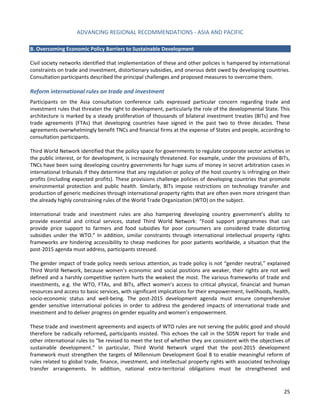
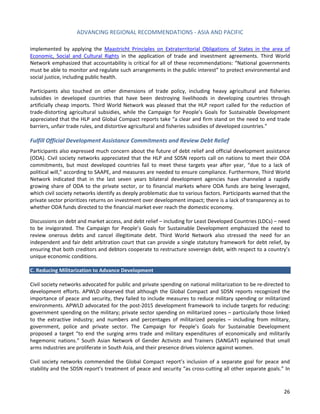
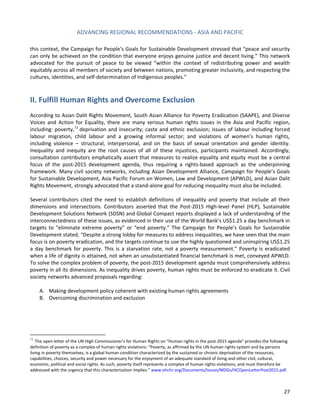
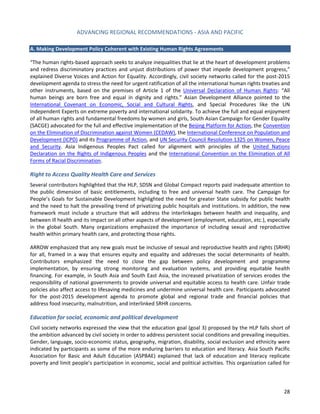
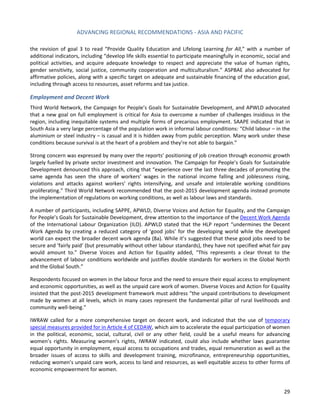
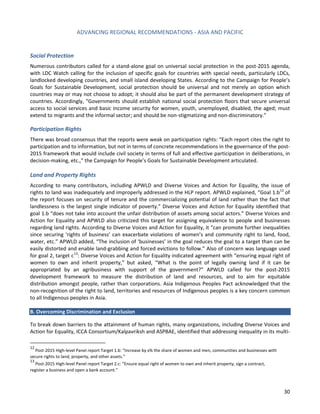
![ADVANCING REGIONAL RECOMMENDATIONS - ASIA AND PACIFIC
31
dimensional forms is essential in order to eradicate poverty through social, economic and ecological framing. SACGE and Asian Dalit Rights Platform explained that this necessitates recognizing the ways in which multiple factors – age, race, ethnicity, class, caste, tribe, gender, language, religion, sexual orientation, and disability – increase and compound discrimination and marginalization. Indicating that some communities are marginalized because they are not perceived as equal, the Campaign for People’s Goals for Sustainable Development acknowledged that attempts to eradicate extreme poverty cannot be effective if they do not challenge the structures that reinforce discrimination and inequality between people. Therefore, Asian Dalit Rights Movement recommended that the post-2015 development framework should call for laws, policies and programmes that protect and promote equality, equity, social inclusion, absence of stigma, and accessibility within different intersecting identities, along with principles of substantive equality and non-discrimination.
Gender Equality and the Rights of Women
Many contributors, including SACGE, Diverse Voices and Action for Equality, and IWRAW, welcomed the stand- alone goal on gender equality, considering it an unquestionable component of a transformative agenda. SACGE expressed, however, that the goal “does not include how the multiple forms of discrimination and violence against women – which are major obstacles across South Asia – result in deeper experiences of poverty, deprivation and social marginalization; how women face unequal and unfair burden of the well-being of the society and economies in both the wage and the care economy; and how women face violation of their human rights that obstruct their equitable participation in economic, social and political life.” IWRAW, SANGAT, and Diverse Voices and Action for Equality also articulated concerns regarding systemic barriers to women’s rights to inherit and own property, learn skills, sign a contract, register a business and open a bank account.
Third World Network provided a detailed set of recommendations that the post-2015 development framework should incorporate in order to advance gender equality and women’s empowerment:
• Inter-weave gender dimensions in all goals, in addition to a dedicating a goal to gender equality.
• Ensure access to productive resources (physical, financial and human) such as land, water, credit, infrastructure, skills and technology for women by making public investment in these areas, if needed.
• Enact policies including external sector policies to protect and promote women’s entrepreneurship especially in small and medium enterprises with access to credit, infrastructure, technology, and market access on fair terms.
• Recognize care work as critical to survival of the economy and society, and promote means to ease the burden of care work (e.g. by necessarily providing public services/sourcing of healthcare, education, energy, water).
• Deepen introspection about protection of women: Implement policies focused on changing social mindsets through education, awareness building, etc.
Regarding political representation of women, IWRAW and ARROW called for incorporating a proactive component instead of simply requiring the elimination of discrimination. IWRAW recommended that targets should include a reference to “ensuring the full and equal participation of women in all public and private decision-making […] to ensure that States involve women and civil society organizations as partners in all aspects of development-related decision-making, including development finance and macroeconomic policy.”](https://image.slidesharecdn.com/advancingregionalrecommendationsonthepost2015developmentagenda1-141205215235-conversion-gate02/85/Advancing-regional-recommendations-on-the-post-2015-development-agenda-1-31-320.jpg)
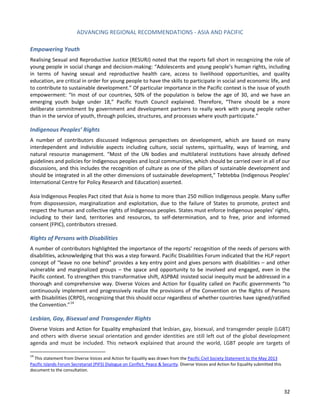
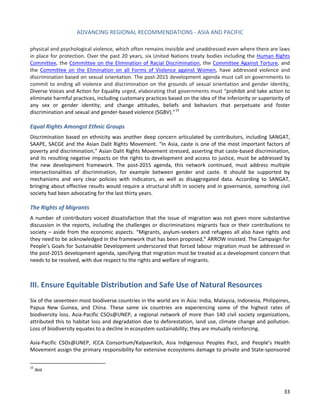
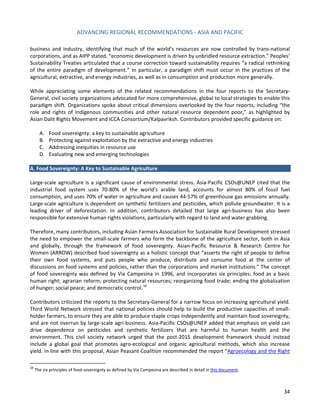
![ADVANCING REGIONAL RECOMMENDATIONS - ASIA AND PACIFIC
35
to Food,” by the UN Special Rapporteur on the Right to Food, which explains that in recent agro-ecological projects in 20 African countries, average crop yields more than doubled over a period of 3-10 years.
17
The Campaign for People’s Goals for Sustainable Development contended that the following economic dynamics limit food access and must be addressed urgently: the production of cash-crops for export at the expense of food self-sufficiency; speculative investment in food commodities that results in steep increases in the world price of staples; and private investors seizing control of millions of acres of farmlands in poor countries to take advantage of rising farmland values. Asia-Pacific CSOs@UNEP specified that economies must instead adopt the following practices, which follow the principles of food sovereignty:
[E]nsure equitable control and access over wealth and productive resources such as land, energy, water, seeds, forests and livestock; ensure the right to food, developed through bio-diverse, ecologically sound, humane practices and methods; respect the rights, cultures, languages and wisdom of Indigenous peoples and local communities; and acknowledge already existing sustainable practices by people in various fields of agriculture, sustainable consumption, environmentalism, and recycling.18
Tebtebba identified the recognition of land tenure rights as critical for ensuring food sovereignty and preventing land grabbing and land degradation.
Third World Network recommended the promotion of public programmes on food stockholding, which benefit small producers through price support, as well as poor consumers. This organization also suggested that the post-2015 development framework should encourage all countries to adopt the UN Food and Agriculture Organization (FAO) Right to Food Guidelines. Similarly, Diverse Voices and Action for Equality called on governments to strengthen the FAO World Food Security Voluntary Guidelines on the Responsible Governance of Tenure of Land, Fisheries, and Forests in the Context of National Food Security, by reconfiguring them “toward enforceable multilateral agreements, including on responsible agricultural investment.”
B. Protecting Against Exploitation by the Extractive and Energy Industries
“Of the more than a hundred corporate mines currently operating in Indigenous territories in Asia, there is no single mining company that has undertaken a credible process of obtaining the free, prior and informed consent of the affected Indigenous peoples.” - Asia Indigenous Peoples Pact
According to several contributing organizations, extractive industries in Asia are committing widespread human rights violations, displacing millions of people and destroying land, water and sacred sites. Indigenous people are disproportionately affected. This is partly because the rich deposits of resources are located on Indigenous lands, but it is also because the extractive industries target lands occupied by communities that lack financial means to resist. This does not mean these communities acquiesce. “Amazing people’s movements have responded to extractive industries and resource-grabbing, and have resulted in a contestation of who the resources belong to,” underscored South Asian Network of Gender Activists and Trainers (SANGAT). However, many of the Indigenous people resisting peacefully have suffered serious violation of their civil liberties, stated South Asian Alliance for Poverty Eradication (SAAPE).
17 Report by the UN Special Rapporteur on the Right to Food, “Agroecology and the Right to Food.” (2011).
18 This statement is drawn from the Kathmandu Declaration of the Asia‐Pacific Major Groups and Stakeholders Regional Consultation Meeting with UNEP, submitted by Asia-Pacific CSOs@UNEP.](https://image.slidesharecdn.com/advancingregionalrecommendationsonthepost2015developmentagenda1-141205215235-conversion-gate02/85/Advancing-regional-recommendations-on-the-post-2015-development-agenda-1-35-320.jpg)
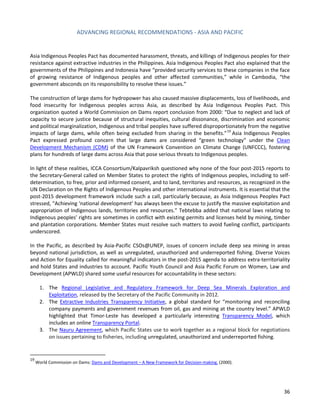
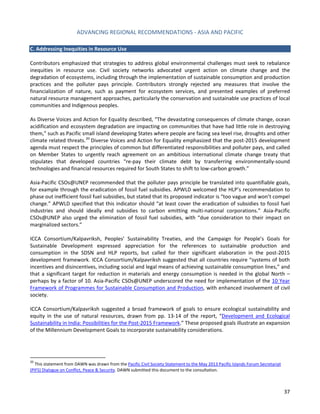
![ADVANCING REGIONAL RECOMMENDATIONS - ASIA AND PACIFIC
38
In response to the SDSN report’s recommendations for the implementation of payment for ecosystem services (schemes that provide financial incentives for natural resource management), the Campaign for People’s Goals for Sustainable Development articulated a strong rebuke:
[T]he commodification of nature and ecosystems creates more incentives for privatization and accumulation of these resources which, in turn, fuels further resource exploitation and displacement of many marginalized communities (e.g. forests turned into biofuels or industrial tree plantations). There is also a denigration of the intrinsic values of nature and erosion in the stewardship role of communities. Creating market values for natural resources will make them more vulnerable to powerful investors who prioritize profits over people and the environment.
Asia Pacific CSOs@UNEP added that payment for ecosystem services can divide communities. This network asserted that ecosystems conservation is most effectively achieved through the traditional expertise of Indigenous and local communities.
To protect biodiversity and respond to climate change impacts on communities, Tebtebba emphasized two indispensable management processes: the ecosystems approach – the primary framework for action under the Convention on Biological Diversity – and territorial management planning, in which communities map their resources, consider sustainable use studies, and develop plans to holistically manage the physical, social, political, and spiritual dimensions of a territory.21 Asia Indigenous Peoples Pact elaborated that territorial management planning is critical to ensuring the right of self-determination for Indigenous peoples in the management of resources within their territories.
“Traditional knowledge – especially of Indigenous women – has been critical in the food security of Indigenous peoples, enhancement of biodiversity, the practice of herbal medicine, and the innovation of Indigenous technologies,” stated Asia Indigenous Peoples Pact. “All of these have contributed to sustainable development.”
D. Evaluate New and Emerging Technologies
ICCA Consortium/Kalpavriksh observed that although many forms of traditional knowledge have sustained human societies for millennia, the four post-2015 reports to the Secretary-General tend to focus on the development of modern science and technology. Particularly in the energy and agriculture sectors, many new technologies are being promoted as contributions to sustainable development, identified Asia-Pacific CSOs@UNEP. Civil society organizations urge thorough and independent evaluation of new technologies to prevent unintended harm to human health and the environment. “The capacity of international institutions, national governments and local communities to evaluate new and emerging technologies needs to be strengthened,” Asia-Pacific CSOs@UNEP asserted. This civil society network pointed to the 2012 UNEP Foresight Report, which proposed the adoption of regional or international mechanisms to assess technologies. This network further noted that Paragraph 275 of the agreed outcome document of the United Nations Conference on Sustainable Development refers to the necessity to build the capacity to evaluate the impacts of new and emerging technologies at the national and regional levels. ICCA Consortium/Kalpavriksh asserted that the post-2015 development agenda should value and support not only new technologies, but also the knowledge of local communities and Indigenous peoples as crucial to sustainability and equity.
21 http://blog.ecoagriculture.org/2012/03/14/forest_peoples_programme/](https://image.slidesharecdn.com/advancingregionalrecommendationsonthepost2015developmentagenda1-141205215235-conversion-gate02/85/Advancing-regional-recommendations-on-the-post-2015-development-agenda-1-38-320.jpg)
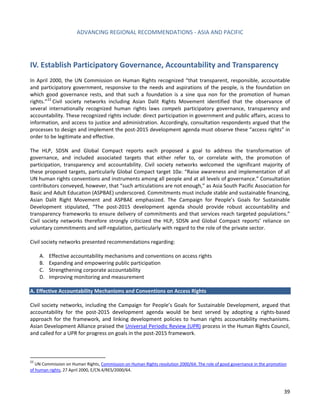
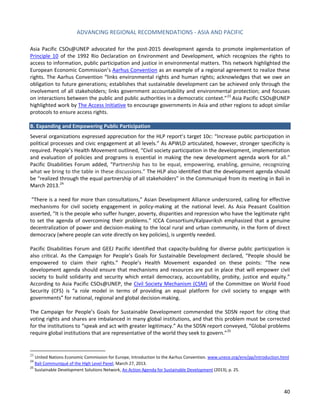
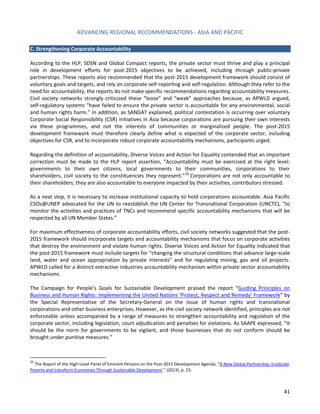
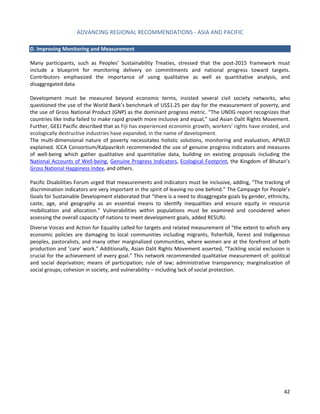
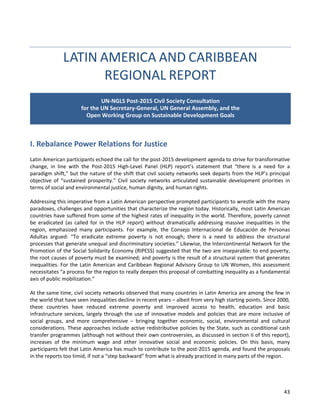
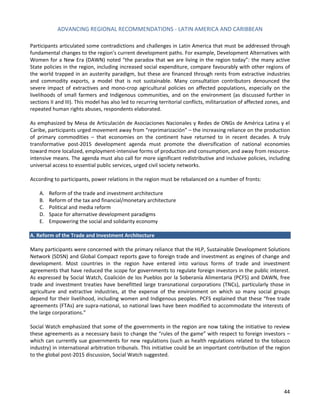
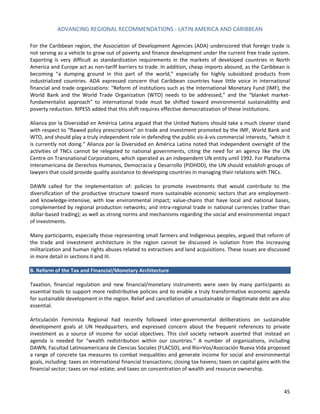
![ADVANCING REGIONAL RECOMMENDATIONS - LATIN AMERICA AND CARIBBEAN
46
RIPESS proposed goals and targets to frame these redistributive policies and combat excessive concentrations of wealth and land ownership: “One universal objective could be ‘maximum limits on wealth per person or enterprise’: Less than x% of the persons or enterprises cannot own more than y% of GDP/land/economic power. With this, we are addressing land reform, economic power in terms of donations to electoral campaigns and privileges of those in political office or close to political elites.”
Gender, Economic and Ecological Justice (GEEJ) – LAC proposed policies and regulations on private finance that would discourage speculation and favour long-term investments aligned with the human rights and environmental commitments of States. This would require strengthening the new regional financial and monetary architecture under construction in parts of Latin America, including by: creating a regional monetary fund that would pool foreign currency reserves to combat speculative attacks and to compensate for economic asymmetries within the region; extending intra-regional trade through regional complementary currencies; and bolstering the newly created Banco del Sur (“Bank of the South”) as well as ensuring that it is oriented to finance key development objectives, such as food sovereignty, health and education – as a counter-point to the other development banks in the region “that are primarily financing infrastructure geared for exports.” The overall thrust of the new regional financial architecture should be to promote economic activities that reduce wealth concentration and biodiversity depletion, such as initiatives of agro-ecology, solidarity economy and peasant agriculture, respondents asserted. RIPESS emphasized the need for effective local access to these alternative regional funds, to ensure local control of project funding allocations and monitoring of effectiveness. This could involve channeling these resources through local community development banks mentioned in the section below on the social and solidarity economy.
Reform of the financial architecture also means that the international community must durably address the problem of unsustainable and illegitimate debt. Social Watch notes with concern that in the HLP report, “the goals on solving the debt problem and of attending the special needs of least developed countries, land-locked countries and small island States that were included in MDG 8 have dropped off the list (without saying why).” ADA noted that debt levels in the Caribbean had reached levels that are so unsustainable that children not yet born already carry the burden of [impossible] debt repayment. Some Latin American countries, such as Ecuador and Argentina, have been able to take unilateral measures to reduce their external debt burden, which freed up resources to invest in development and poverty alleviation programmes. However, in the absence of an independent and fair international debt resolution mechanism, countries remain vulnerable to asymmetric power relations between debtors and creditors.
Some participants also referred to the need to integrate discussion of “ecological debt” in the post-2015 development agenda, which is discussed in more detail in section III.
C. Political and Media Reform
Many participants noted that extremely high levels of inequality in the region go hand in hand with a historical concentration of political, economic, and media power in the hands of a few major conglomerates. FLACSO noted that in each of the Latin American countries, the media is controlled by a small number of families, and the ties between the media and commercial interests are very strong. Accordingly, GEEJ-LAC proposed policies that would favour the democratization of the media and counter the concentration of their ownership. RIPESS mentioned that laws regulating media have been approved or are being discussed in several Latin American countries, including Ecuador, Argentina and Uruguay.](https://image.slidesharecdn.com/advancingregionalrecommendationsonthepost2015developmentagenda1-141205215235-conversion-gate02/85/Advancing-regional-recommendations-on-the-post-2015-development-agenda-1-46-320.jpg)
![ADVANCING REGIONAL RECOMMENDATIONS - LATIN AMERICA AND CARIBBEAN
47
To prevent excessive concentration of political power, Coordinación de ONG y Cooperativas (CONGCOOP) proposes a goal to democratize political parties and the financing of electoral campaigns with the following targets: 80% of political party campaigns must come from a common public pool; and only 20% from the private sector or individuals. Political reform is key to strengthening democracy and to addressing social inequalities; according to DAWN, the reform of campaign finance should be accompanied by mechanisms to increase the political participation of women, Afro-descendent people, Indigenous people, lesbian, gay, bisexual and transgender (LGBT) people, and other social groups that have been socially excluded.
D. Space for Alternative Development Paradigms
Many Latin American participants were adamant that the post-2015 agenda should not lead to a homogenized view of development. FLACSO explained: “For Latin America, one cannot speak of universal goals without considering diversity. Respect for diversity practically does not appear in the reports. It is as if the whole world should convert to one global labour and consumer market.” FLACSO provided the example that mainstream development thinking assumes that continued urbanization is inevitable just because it has been occurring since the middle of the 20th century. This assumption should be countered, FLACSO asserted, and measures that support rural habitation such as the “right to land – to work and live on” should be promoted. Developing this point further, Campaña Latinoamericana por el Derecho a la Educación (CLADE) stated: “We are preoccupied with the homogenizing perspective in the [HLP] report. It takes it for granted that development is the equivalent of “modern, urban and global” societies, and ignores totally the diversity of cultures and peoples.”
Many Latin American participants put forward the Indigenous concept of “Buen Vivir” (living well) – a worldview and development paradigm based on the objective of harmonious relations between individuals and community, between humans and nature, and which features in the new constitutions of Ecuador and Bolivia. For example, the Ecuadorian constitution of 2008 outlines seven dimensions of “The Rights of Buen Vivir,” related to: water and food; a clean environment; communication and information; culture and science; education; housing; health; and work and social security. Ecuador’s “National Plan for Buen Vivir 2009-13” seeks to implement a “change of paradigm from development to buen vivir” through 12 national objectives, each involving specific policies and targets.
E. Empowering the Social and Solidarity Economy
A number of participants emphasized the need to include the social and solidarity economy (SSE) as an alternative economic model that can address all three dimensions of sustainable development. DAWN emphasized that “the objectives of the economy have to be the sustainability of life and social redistribution. If one wants to meet sustainable development goals, the social and solidarity economy provides a much more direct and universal path.”
The SSE movement is a worldwide phenomenon, growing particularly fast in Latin America. It promotes economic relations based on shared values such as cooperation rather than competition, reinvestments and redistribution of surpluses for social and environmental goals rather than profit maximization, democratic economic management, and respect for ecological limits. It is growing from the diverse experience of myriad initiatives involving networks of cooperatives, self-managed enterprises and other groups and associations involved in activities of production of goods and services, distribution, solidarity finances and responsible consumption. RIPESS noted: “The SSE thus expands the range of actors that promote development far more than a corporate-centered approach. Its initiatives intrinsically address cultural diversity, social inclusion,](https://image.slidesharecdn.com/advancingregionalrecommendationsonthepost2015developmentagenda1-141205215235-conversion-gate02/85/Advancing-regional-recommendations-on-the-post-2015-development-agenda-1-47-320.jpg)
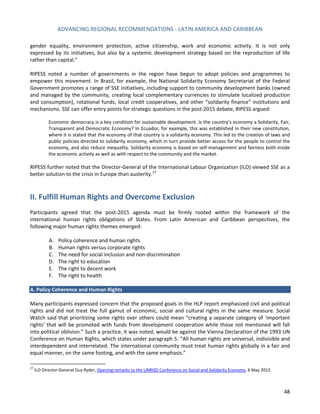
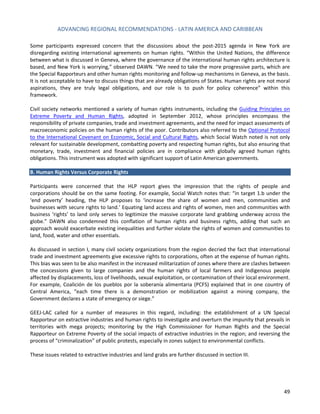
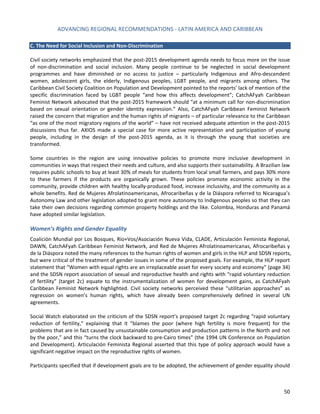
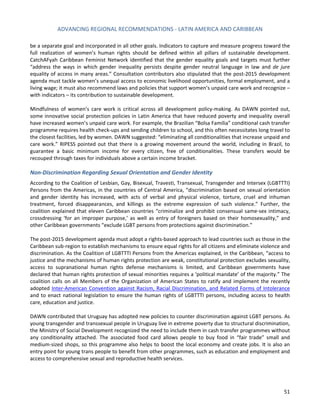
![ADVANCING REGIONAL RECOMMENDATIONS - LATIN AMERICA AND CARIBBEAN
52
D. The Right to Education
Many civil society networks were critical of the approach to education in the HLP report, which they see as framing education as a vehicle to fulfill labour market needs. CLADE mentioned that this “reductionist view” of education derives especially from the World Bank and other international financial institutions (IFIs), where education for development has been boiled down to employability and measurable outcomes in “reading, writing and basic math,” which is inconsistent with the much wider and development-friendly view of education put forth in the Universal Declaration of Human Rights, the International Covenant on Economic, Social and Cultural Rights and many other human rights instruments. The goal of education is for the full development of the human being and society; education is also important to strengthen democracy and peace, respondents stressed. For Asociación Latinoamericana de Educación Radiofónica (ALER) and many others, education is the key to transform values, to form attitudes, to promote democratic and cultural practices for self-empowerment; it also provides the basis for transformation with full participation and inclusion. CatchAFyah Caribbean Feminist Network underscored that education is a human right, and this “needs to be made explicit” in the post-2015 development framework.
A goal on education should include targets for adequate remuneration and benefits for teachers (FLACSO), as well as good working conditions, and overcoming illiteracy among youth and adults (CLADE). RIPESS advocated for the post-2015 framework to acknowledge the role of popular and traditional knowledge in preserving history and culture “as a valid world view and source of knowledge alongside formal academic sciences.” It should also promote non-discrimination and a culture of human rights, stated CLADE, and “should furthermore make explicit the obligation of States toward free education, at least in compulsory stages and progressively beyond, as stated in General Observations of the Committee of Economic, Cultural and Social Rights.”
ALER and Consejo Internacional de Educación de Personas Adultas (ICAE) referred to the concept of lifelong learning, which according to ICAE, must be based on four pillars: learning to know, to do, to be, and to live together. CatchAFyah Caribbean Feminist Network pointed to the tension between the HLP report’s goal 3, “Quality Education and Lifelong Learning,” and the targets within that goal, which stop at universal lower secondary education. For the Caribbean, the education target has to be more ambitious than lower secondary school “because only university level education makes a difference in women’s earnings. […] InterAmerican Development Bank (IADB) research has demonstrated that in the region men (as a group) with only primary education outearn women (as a group) with secondary education,"28 CatchAFyah Caribbean Feminist Network explained. So if we want to link the education goal to the gender equality goal, for the Caribbean the target cannot be universal lower secondary education,” CatchAFyah Caribbean Feminist Network explained. CPDC called for enhanced quality of education, and Caribbean Regional Youth Council advocated improvements in technical and vocational education in order to match skills with employment opportunities.
E. The Right to Decent Work
Social Watch and Americas Union Confederation drew attention to the HLP report’s use of the concept of “good jobs,” derived from the development model of the World Bank, rather than the concept of Decent Work adopted by members of the ILO. Contributors explained that “good jobs” refers to sufficiently remunerated employment, but leaves out other essential dimensions of the Decent Work Agenda, namely rights at work, social protection and social dialogue.
28 InterAmerican Development Bank, “Gender Earnings Gaps in the Caribbean: Evidence from Barbados and Jamaica,” (2010)](https://image.slidesharecdn.com/advancingregionalrecommendationsonthepost2015developmentagenda1-141205215235-conversion-gate02/85/Advancing-regional-recommendations-on-the-post-2015-development-agenda-1-52-320.jpg)
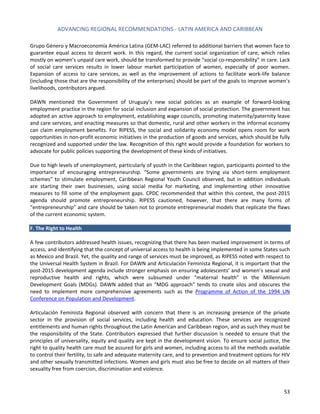
![ADVANCING REGIONAL RECOMMENDATIONS - LATIN AMERICA AND CARIBBEAN
54
III. Ensure Equitable Distribution and Safe Use of Natural Resources
As mentioned in sections I and II, civil society organizations from Latin America expressed deep concern at the unsustainable use of natural resources in the region, even when these serve to finance programmes that help reduce poverty and inequality. Civil society networks call on the post-2015 development agenda to:
A. Increase regulation of agro-industrial plantations and extractive industries
B. Promote a “commons” approach to natural resource management
C. Promote land reform and small-scale agriculture, especially agro-ecology
D. Address climate change and the historical responsibilities of industrialized countries
E. Implement clean technology transfer and assessment
F. Reform sustainable development governance
G. Further assess the concept of development within planetary boundaries
A. Increase Regulation of Agro-industrial Projects and Extractive Industries
Contributors were very critical of current standard practices of natural resource-based industries, including in large scale agro-industrial projects, mining, and hydrocarbons (oil and gas). As noted earlier, these projects are causing enormous environmental damage and pushing many individuals – and in some cases whole rural communities – off the land on which they depend for a living. This is not only the case in many parts of Latin America; in the Caribbean, extractive industries, over-fishing, tourism, sugar, and other economic activities “have resulted in economic growth in periods of boom but [also] long-term ecological imbalance” as well as biodiversity loss and pollution, Caribbean Policy Development Centre (CPDC) identified.
Caribbean Youth and Environment Network highlighted the impunity enjoyed by extractive industries due to the high level of money they bring in to Caribbean countries: “Some quarries are not adhering to rules and certificates of environmental clearance”; mining and other extractive industries face little intervention from Caribbean governments, participants asserted. Greater transparency and regulation will be necessary to protect ecosystems in the region from pollution and exploitation.
Local communities in many countries are organizing to face these issues and propose solutions. FLACSO and ICAE mentioned that communities in Chile affected by large mining and agro-industrial projects are organizing under the ILO’s Convention 169, which gives them legitimacy and strength to face the companies behind the natural resource-based projects, defend their interests and work with them if necessary.
B. Promote a “Commons” Approach to Natural Resource Management
Global initiatives aimed at curbing environmental degradation, such as Reducing Emissions from Deforestation and forest Degradation (REDD), REDD+ and the Green Economy, have not succeeded, according to many participants who equated these initiatives with the “financialization” or “commodification” of nature. According to Alianza por la Biodiversidad en América Latina, GFC, Río+Vos/Asociación Nueva Vida and PCFS, these initiatives are contributing to climate change, promoting monoculture, contaminating water, displacing people and turning public goods like water into financial assets for large companies and speculators.](https://image.slidesharecdn.com/advancingregionalrecommendationsonthepost2015developmentagenda1-141205215235-conversion-gate02/85/Advancing-regional-recommendations-on-the-post-2015-development-agenda-1-54-320.jpg)
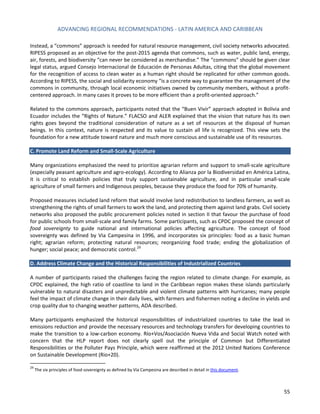
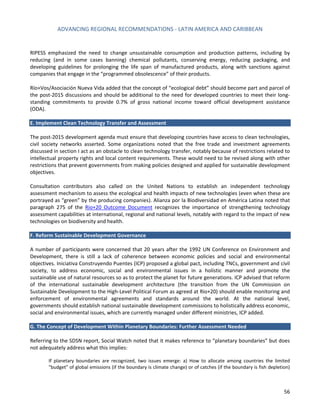
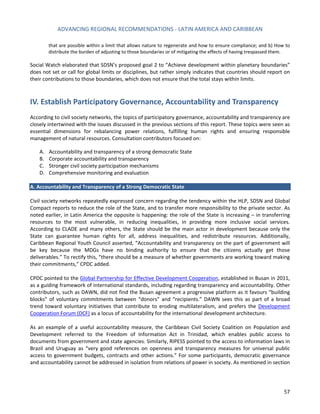
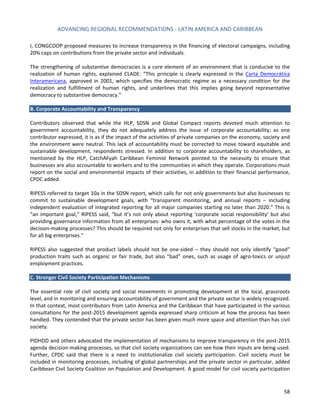
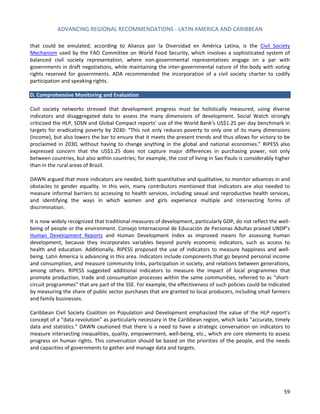
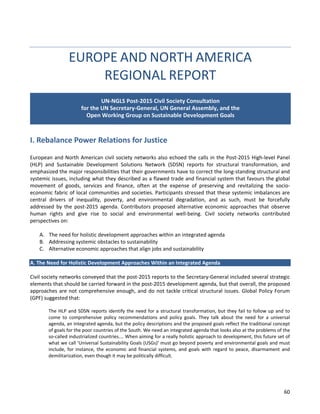
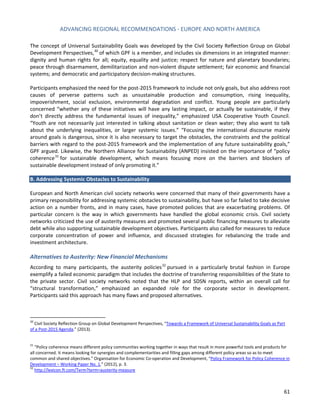
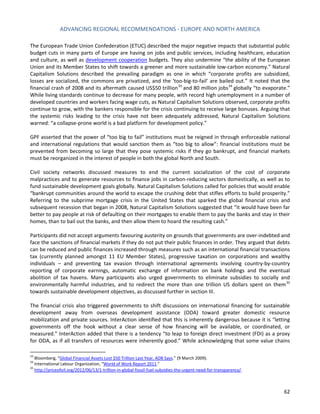
![ADVANCING REGIONAL RECOMMENDATIONS - EUROPE AND NORTH AMERICA
63
are aligning to provide some social good, InterAction warned, “The problem is that there aren’t clear established norms [to assess] what is working and what the return is on the social side.” These issues will become all the more complex as the question of financing sustainable development goals (SDGs) interfaces with the negotiations on climate finance, InterAction highlighted.
For GPF, “the post-2015 agenda must come to a new global system of financial burden-sharing beyond ODA.” Citing that the HLP and SDSN reports mainly refer to the 0.7% target and to aid-based development financial transfers, GPF advocated an alternative approach:
Instead, we must come to a rights-based approach of financial transfers. There must be a new mandatory system, a fiscal equalization scheme, or a compensation scheme, to pay off climate debt or other forms of debt… A future development agenda, which is holistic, must go beyond the traditional division of the world between developed and developing countries and must go beyond this traditional concept of ODA. It must find new forms of financial transfers, which imply the commitment and the obligation of the rich countries to pay more to the poor countries than they do now.
On the resource allocation side of the equation, InterAction called for “budget transparency, the publishing of budgets, the ability of local civil society to engage in a budget process and the degree to which those budgets focus on different populations.” GPF suggested that a key challenge that must be addressed in the post-2015 discussions, particularly by the Intergovernmental Committee of Experts on Sustainable Development Financing, is aligning public budgets with sustainability. “SDGs only make sense when they are reflected in sustainable development budgets,” GPF asserted.
Addressing Corporate Concentration of Power
A number of participants emphasized the need to address what they described as the excessive concentration of power and influence of major multinational corporations. Taking agribusiness firms as an example, ETC Group referred to a report it had just produced “Putting the Cartel before the Horse” which asserts that 6 transnational corporations control well over 50% in every sector of agricultural inputs at the global scale– ranging from plant breeding and commercial seeds to agro-chemical sales. “Most economists still would argue that when you get above 50% for 6 companies you end up in a cartel environment, and secondly, of more concern, you actually reduce the level of innovation among companies. We can’t afford to be in that situation.”
ETC Group argues that these global cartel arrangements make national competition policy insufficient and called on the United Nations to create a platform for dialogue on these and related issues, such as intellectual property rights, which it described as “perhaps the most powerful form of subsidy when it comes to creating corporate concentration and reducing innovation....”
Participants were equally concerned by the degree to which concentration of corporate power is distorting democratic policy-making. Referring to “powers and interests against sustainability,” ANPED argued that sustainability is “not a technical problem, it’s a political problem.” GPF mentioned that Goldman Sachs has been lobbying against the financial transactions tax in the European Union and that other major businesses are trying to resist country-by-country reporting36 required by US legislation, not only by lobbying but also through lawsuits. Canadian Center for Policy Alternatives (CCPA) warned that engaging the corporate sector cannot just be about incentives and voluntary initiatives: the post-2015 discussions must include the need “to take harsh
36 http://www.publishwhatyoupay.org/about/advocacy/country-country-reporting](https://image.slidesharecdn.com/advancingregionalrecommendationsonthepost2015developmentagenda1-141205215235-conversion-gate02/85/Advancing-regional-recommendations-on-the-post-2015-development-agenda-1-63-320.jpg)
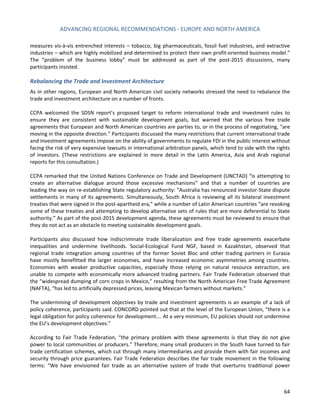
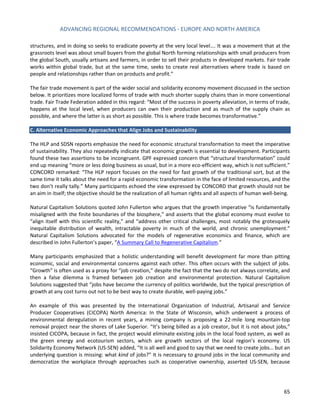
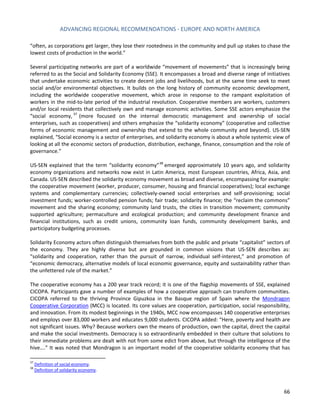
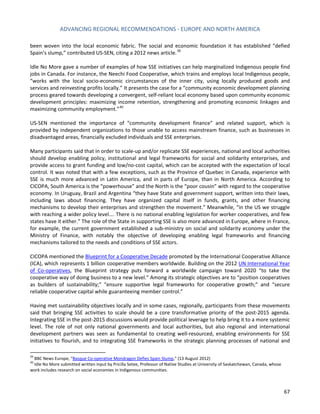
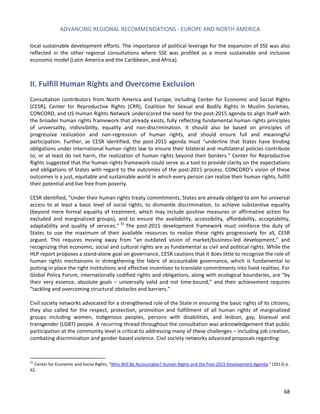
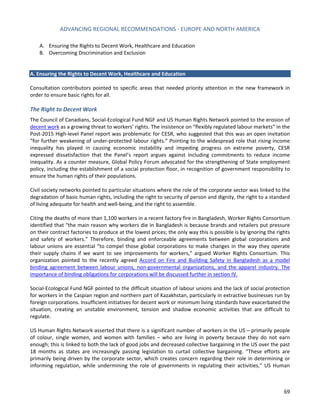
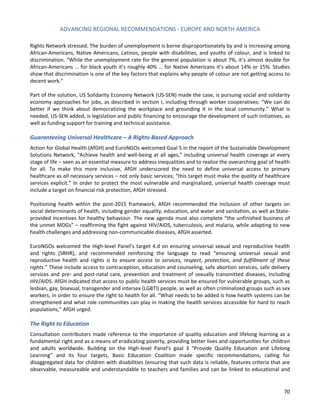
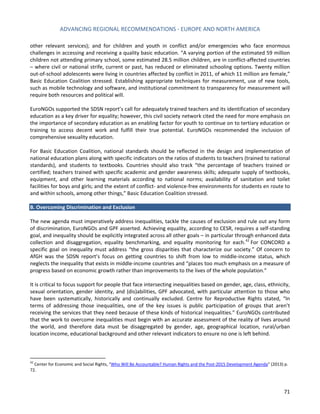
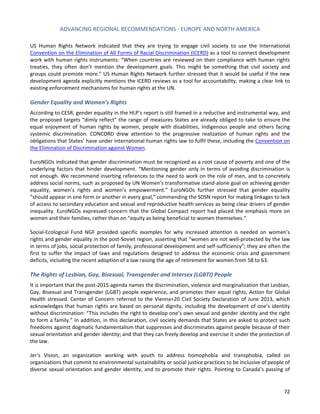
![ADVANCING REGIONAL RECOMMENDATIONS - EUROPE AND NORTH AMERICA
73
laws to protect the rights of LGBT people, Jer’s Vision acknowledged the role of the church in bringing about positive change: “What has been helpful in causing policy and systemic changes within police forces, institutions, schools, communities and community organizations is that Canada’s Anglican church has become gay friendly and several of its dioceses now permit gay marriage. This has had a strong impact in addressing homophobic and gender-based violence in our country.” Coalition for Sexual and Bodily Rights in Muslim Societies pointed to progress made in several countries in the European Union, where nine countries have legalized same-sex marriage, and three more are considering same-sex marriage bills: Finland, Luxembourg and Scotland.
Indigenous Peoples’ Rights
Idle No More,43 an Indigenous peoples’ mass movement, indicated that the dominant socio-economic system marginalizes and fails Indigenous peoples who face tremendous development challenges, including low life expectancy rates, inadequate housing, and unemployment. In addition, rural and remote Indigenous peoples experience difficulties with bureaucracies and societies that do not understand the need to hunt, trap, fish or otherwise harvest from the environment for sustenance: “Recreational harvest by the non-native population is often considered more important than Indigenous harvest.”
Collectivity is central to Indigenous being, and communities were traditionally governed by principles and laws that emanate from deep respect for all of life – vital when considering community development and establishment of public policy, Idle No More stressed. The UN Declaration on the Rights of Indigenous Peoples outlines the minimal standards of development that Indigenous peoples have requested, the organization emphasized, indicating that Indigenous communities are demanding equal and transparent partnership processes and a halt to destructive economic development practices in their communities: “We need a new model of development that utilizes the talents of entire communities for the liberation and benefit of entire communities, ones that embrace the Indigenous principles of wakotawin [deep respect for all life] and miywichitowin [establishing good relations with humankind, the animal world and nature],” and underpinned by values of mutual respect and dignity.
The Rights of People Living with Disabilities
CESR referred to a recent global survey that suggests that more than one billion individuals experience disability, with attendant impact on health, educational achievement, economic opportunities and poverty.44 The post-2015 development negotiations should therefore imperatively engage with this issue, building on the normative framework which the Convention on the Rights of Persons with Disabilities provides. Thus far, the Convention has been ratified by 134 States, not including the United States, and its Optional Protocol has garnered 77 ratifications.
Center for Reproductive Rights (CRR) drew attention to the disability rights movement, indicating that it has made tremendous strides over the past decade through a set of means, including problem recognition and dialogue, that could be beneficial in discussions on the post-2015 agenda: “One of those is, first, recognition from governments that there’s a problem that exists, that there is inequality that needs to be addressed.” This recognition leads to other processes, including forums in which different groups are brought together to talk about the issues, inequalities and ways to address them. “When groups come together, even if they have conflicts they are often able to work them out to come together to form a common message and bond. That’s
43 Idle No More submitted written input by Priscilla Settee, Professor of Native Studies at University of Saskatchewan, Canada.
44 WHO and World Bank, World Report on Disability 2011 (Geneva, 2011).](https://image.slidesharecdn.com/advancingregionalrecommendationsonthepost2015developmentagenda1-141205215235-conversion-gate02/85/Advancing-regional-recommendations-on-the-post-2015-development-agenda-1-73-320.jpg)
![ADVANCING REGIONAL RECOMMENDATIONS - EUROPE AND NORTH AMERICA
74
what we saw with disability rights groups from all people with intellectual disabilities, people from the blind community, all sorts of different issues but they were able to come together with one voice once these forums started getting opened up for their engagement in those issues and their self-advocacy on those issues,” CRR explained.
III. Ensure Equitable Distribution and Safe Use of Natural Resources
It is essential for the post-2015 development agenda to ensure “ecological integrity”45 in order to ensure human well-being, identified Natural Capitalism Solutions. “This basic principle of sustainability ought to be embedded at every level, and be the touchstone from which all of the goals flow.” The agenda must fundamentally re-orient natural resource management, asserted Social-Ecological Fund NGF: “The way that the world has been developing since the industrial revolution cannot continue in the post-2015 period.”
Natural Capitalism Solutions referred to two reports which irrefutably establish that the current course of human activity is unsustainable: Planetary Boundaries: Exploring the Safe Operating Space for Humanity, by an interdisciplinary group of 28 internationally renowned scientists, and Global Biodiversity Outlook 3, the most recent global status report from the UN Convention on Biological Diversity.
The Planetary Boundaries report identified nine interdependent boundaries in order to estimate the “safe space for human development.” It warns, “Transgressing one or more planetary boundaries may be deleterious or even catastrophic due to the risk of crossing thresholds that will trigger non-linear, abrupt environmental change within continental- to planetary-scale systems.” The contributing scientists quantified human impacts in seven of the nine areas, and determined that three boundaries have already been transgressed: biodiversity loss (the current rate of species loss will result in “functional collapses”); the global nitrogen cycle (excessive synthetic fertilizer use in agriculture is polluting land, water and air); and climate change (CO2 concentration in the atmosphere has exceeded 350ppm). In addition, human impacts are challenging the planetary boundaries for freshwater use, land-system change, ocean acidification, and the phosphate cycle.
The Convention on Biological Diversity’s Third Global Biodiversity Outlook report similarly states: “There is a high risk of dramatic biodiversity loss and accompanying degradation of a broad range of ecosystem services if ecosystems are pushed beyond certain thresholds or tipping points.”46 Conclusions within this report parallel those of the Planetary Boundaries report:
• Ecosystems are already showing negative impacts under current levels of climate change, [resulting from] an increase of 0.74ºC in global mean surface temperature relative to pre-industrial levels, which is modest compared to future projected changes (2.4-6.4 ºC by 2100 without aggressive mitigation actions). (page 56)
45 “Ecological integrity is the abundance and diversity of organisms at all levels, and the ecological patterns, processes, and structural attributes responsible for that biological diversity and for ecosystem resilience." Coast Information Team, 2004. http://www.sfu.ca/haida-ebm/ecological_integrity/.
46 The Convention on Biological Diversity defines tipping points as “points at which ecosystems shift to alternative, less productive states from which it may be difficult or impossible to recover.” For a fuller explanation of tipping points and their importance, see Leadley, P., et al., “Biodiversity Scenarios: Projections of 21st century change in biodiversity and associated ecosystem services.” Secretariat of the Convention on Biological Diversity. (2010) p. 12. http://www.cbd.int/doc/publications/cbd-ts-50-en.pdf.](https://image.slidesharecdn.com/advancingregionalrecommendationsonthepost2015developmentagenda1-141205215235-conversion-gate02/85/Advancing-regional-recommendations-on-the-post-2015-development-agenda-1-74-320.jpg)
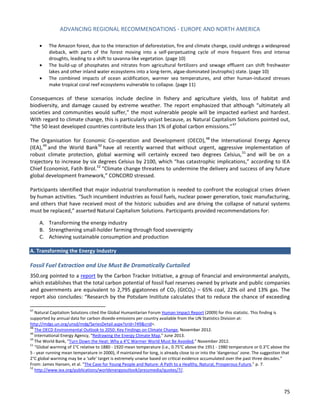
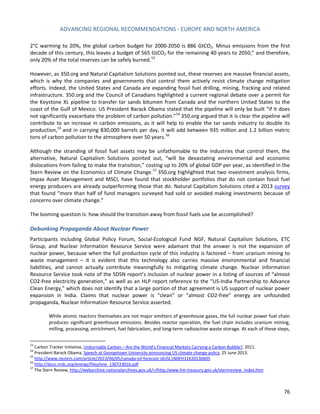
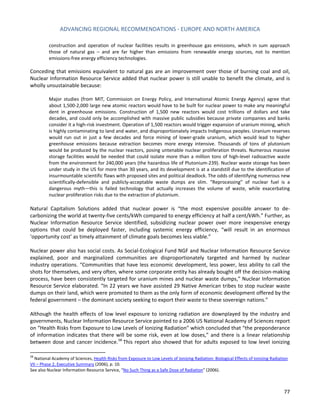
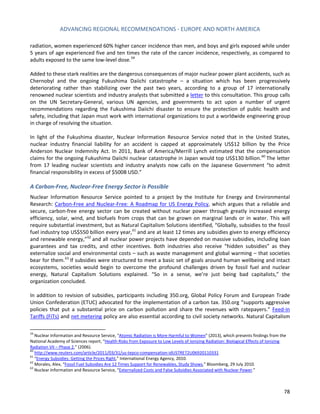
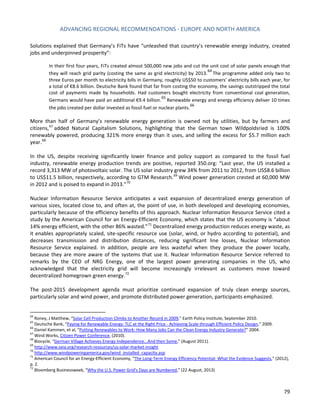
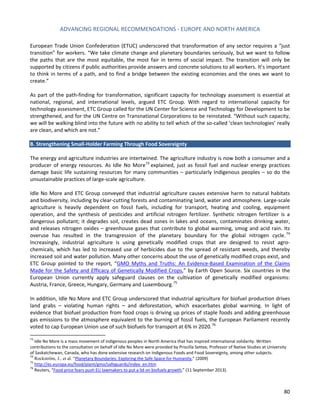
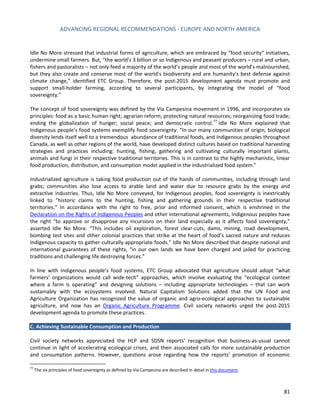
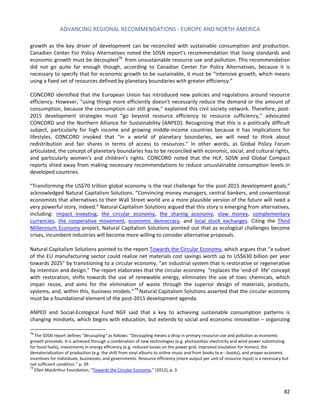
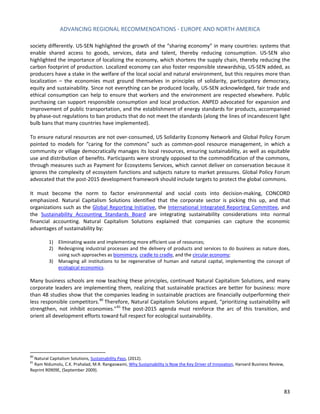
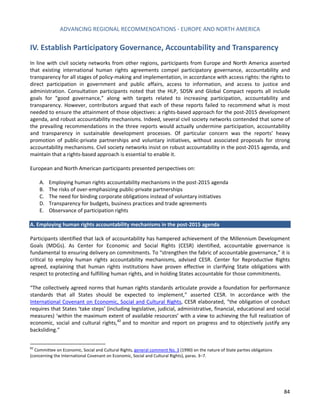
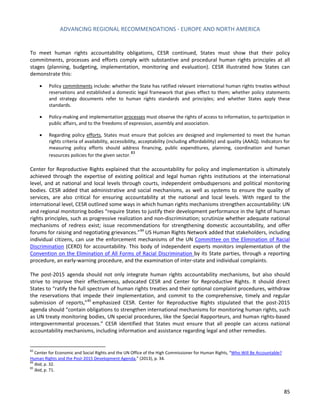
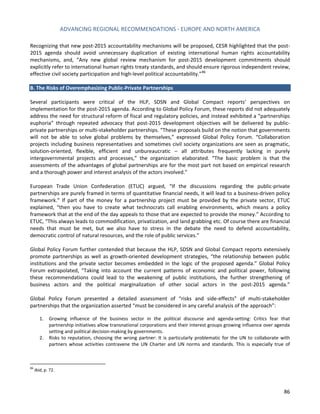
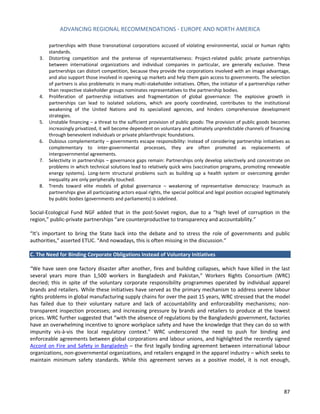
![ADVANCING REGIONAL RECOMMENDATIONS - EUROPE AND NORTH AMERICA
88
emphasized WRC: “These private agreements are only a substitute for what we really should have, which is effective regulation of corporate behaviour by governments.”
However, the HLP, SDSN and Global Compact reports promoted voluntary approaches, without robust accountability mechanisms, as participants including Canadian Center for Policy Alternatives, CESR, CONCORD, and Global Policy Forum highlighted. “The [HLP] report suggests integrated social and environmental reporting for large businesses, but argues for a voluntary ‘comply or explain’ regime under which companies would either report or explain why they are not reporting,” CESR identified. “To be effective, any integrated reporting regime must be mandatory for all large companies.” CONCORD echoed, “If the private sector is seen as a key actor in the delivery of the post 2015 framework, mechanisms will have to be in place for reporting and transparency which go beyond voluntary initiatives towards corporate accountability.” This network continued, “It will be important to avoid the mistakes made in Johannesburg at the World Summit on Sustainable Development where partnerships were established and recognized as delivery mechanisms by the UN, but no formal monitoring or evaluation took place.” With regard to corporate accountability, CESR invoked the value of a rights-based approach for the post-2015 framework: “Human rights norms are unequivocal in requiring that governments set up systems which guarantee the private sector respect human rights universally.” Robust corporate accountability mechanisms are particularly important because, as Canadian Center for Policy Alternatives underscored, entrenched corporate interests “are highly mobilized and determined to protect their own profit-oriented business model.”
CONCORD and Global Policy Forum drew attention to the value of country-by-country reporting – “the breakdown of a company’s financial performance for each country of operation or trading presence,”87 and the mandatory transparency requirements associated with this disclosure. CONCORD and Global Policy Forum highlighted that the EU and US require country-by-country reporting from extractive industries, to curtail tax avoidance and the exploitation of natural resources. These civil society contributors advocated for the requirement of such disclosure to be expanded to other industries.
Global Policy Forum also raised that that post-2015 agenda discussions on binding norms for transnational corporations have so far focused on the “Guiding Principles on Business and Human Rights: Implementing the United Nations 'Protect, Respect and Remedy' Framework,”88 as a “first step.” However, Global Policy Forum stressed that these principles are not as strong as the Draft Norms on Business and Human Rights that fed into them. In GPF’s view, the draft norms should be used as a model “to reach more binding and regulatory rules for transnational corporations in the post-2015 context.”
D. Transparency for Budgets, Business Practices and Trade Agreements
CESR expressed appreciation for the HLP report assertion that “we need a transparency revolution, so citizens can see exactly where and how taxes, aid and revenues from extractive industries are spent,” but called for the post-2015 agenda to outline additional fiscal policy areas that need greater transparency (as well as public participation), such as budgeting and procurement. InterAction also stated that budget transparency is critical, and should involve “the publishing of budgets, the ability of local civil society to engage in a budget process, and the degree to which those budgets focus on different populations.” InterAction recognized that this is
87 http://www.publishwhatyoupay.org/about/advocacy/country-country-reporting.
88 The Guiding Principles on Business and Human Rights were endorsed by the Human Rights Council in resolution A/HRC/RES/17/4 (6 July 2011).](https://image.slidesharecdn.com/advancingregionalrecommendationsonthepost2015developmentagenda1-141205215235-conversion-gate02/85/Advancing-regional-recommendations-on-the-post-2015-development-agenda-1-88-320.jpg)
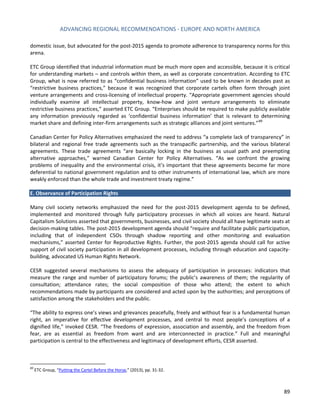
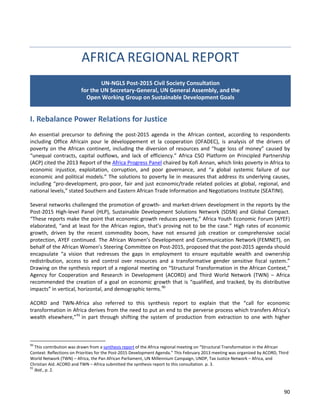
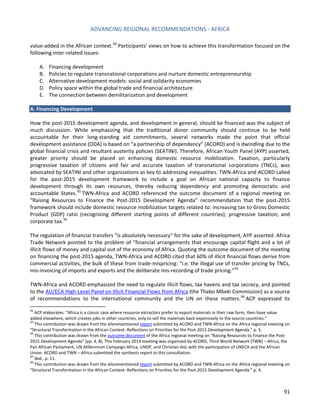
![ADVANCING REGIONAL RECOMMENDATIONS - AFRICA
92
support for the SDSN report’s proposal that “rich countries should take the lead in curtailing abusive transfer pricing and work to close havens that encourage tax evasion and capital flight,” (page 25) as well as for a transparent and independent evaluation system for all businesses. According to OFADEC, African governments must also develop regional agreements to reverse the “race to the bottom” in national tax concessions to foreign corporations.
B. Policies to Regulate Transnational Corporations and Nurture Domestic Entrepreneurship
Participants highlighted that the “democratic developmental State”97 must regulate foreign investments and nurture domestic enterprises and productive capacities to generate employment. While acknowledging that “investment is key in providing employment and stimulating growth,” civil society networks including SEATINI highlighted that appropriate policy and regulation are essential to ensure that private investment truly contributes to development and avoids potential “decapitalisation, crowding out of small and medium enterprise (SMEs), environmental degradation (especially investment in the extractive sector), and tax dodging.”
TWN-Africa asserted the importance of “State policy and action [to] nurture local private enterprise,” in Africa. The Secretariat of the African Decade of Persons with Disabilities (SADPD) mentioned the need for “State development finance institutions that will absorb and manage the risks and barriers that come with financing for populations who cannot access private financing or banks.”
State responsibility in public service provision was positioned by several organizations as an essential alternative to an overreliance on corporate finance for development. TWN-Africa referred to the “insistence on private sector leadership in financing [as] an ideological stance and an ahistorical stance” that benefits large foreign companies rather than the African democratic developmental State.
Africa Trade Network shared Africa-specific examples of “initiatives which lead toward structural transformation of our economy, away from dependence on raw materials toward an economy that involves everybody, from the grassroots all the way to the bigger companies.” These include initiatives of the African Union that aim to guide national policy, including the African Union Continental Free Trade Area agreement, the Africa Mining Vision, and the Comprehensive Africa Agriculture Development Programme (CAADP). Africa Trade Network contributed the following explanation of the Africa Mining Vision as a policy framework that addresses the extractive industries sector:
The Africa Mining Vision (AMV) tries to change the dominant paradigm of investment in the mineral sector, wherein the wealth generated is taken away by the TNCs, with very little left for development initiatives or the local economy. AMV seeks to create a platform for broad-based economic development to generate wealth and create jobs. AMV policies presuppose a number of interventions, including revenue capture, management and expansion, and therefore changes in the proportion of revenue that is captured by nation States in Africa vis-à-vis TNCs. These policies also ensure that the mining sector catalyses economic development in other sectors, and that more opportunities are created for African enterprises and workers. AMV policies also try to improve the governance mechanisms around the mining sector so that communities and constituencies benefit.
Africa Trade Network positioned the AMV as an example of an initiative that can help to achieve structural transformation toward justice for Africa.
97 This concept is elaborated in greater detail in the report of the meeting on Structural Transformation in the African Context. p. 4.](https://image.slidesharecdn.com/advancingregionalrecommendationsonthepost2015developmentagenda1-141205215235-conversion-gate02/85/Advancing-regional-recommendations-on-the-post-2015-development-agenda-1-92-320.jpg)
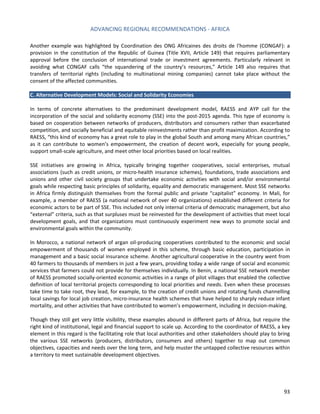
![ADVANCING REGIONAL RECOMMENDATIONS - AFRICA
94
D. Policy Space Within the Global Trade and Financial Architecture
SEATINI underscored that African governments require adequate policy space (room for manoeuver to pursue democratically-defined development policies and strategies calibrated to meet national conditions and needs). Several organizations indicated that the international financial architecture and institutions including the World Bank and the International Monetary Fund (IMF) constrict the ability of national governments, in the words of Africa Trade Network, “to have the political space they need for equitable and effective governance of economic policy.” Global policy for finance, investment, debt and trade must shift to be conducive to development, SEATINI asserted. TWN-Africa and ACORD also called for a rebalancing of “the relationship between the African State and the international community” and the shifting of international architecture to respond to national and regional circumstances and priorities, and to catalyze productive investment.98
On related issues pertaining to the global trade architecture, ACP challenged the HLP report’s emphasis on open or free trade, asserting, “Countries still have a responsibility to protect their nascent industries from exploitation by open markets and big businesses, and should be allowed to ensure small farmers and small businesses benefit in small local markets.” SEATINI emphasized the need to shift trade agreements toward justice at global, regional, and national levels, and to address “the democratic deficit in the global trade- related institutions,” including the WTO, the IMF and the World Bank. The multilateral trading system must be strengthened, “taking into account the full participation of all Member States,” SEATINI continued. Africa Trade Network added that the post-2015 agenda must avoid “reinforcing the negative trends of trade and development that have held the continent back [… and] constrained the space for development.” In particular, Africa Trade Network highlighted the example of export taxes as necessary “to discourage the export of products, especially in their raw and unprocessed forms, in global markets so that they will be available for domestic processing and transformation,” providing the examples of Ghana’s export tax on scrap metal and Kenya’s on leather.
The perennial issue of the need to overcome unsustainable debt was also discussed. ACP stated that the reports leave out that “that much of what we call development is debt-induced growth.” ACP cited the statistic that developing countries’ emerging markets carry a debt burden of 224% of their GDP, a significant global economic reality that should be taken into account in the post-2015 development agenda.
FEMNET and Africa Youth Empowerment Initiative (AYEI) emphasized that the post-2015 agenda should pay particular attention to Least Developed Countries (LDCs) and the implementation of the Istanbul Programme of Action. AYEI commended the HLP’s inclusion of “Transform Economies for Jobs and Inclusive Growth” as one of its five transformative shifts, “because the LDCs need to be empowered to overcome dependency.”
E. The Connection Between Demilitarization and Development
The issue of militarization in Africa was identified by several participants as contributing to conflict, violence including against women, the destabilization of communities, as well as major shortfalls in financing for development. Femmes Africa Solidarité (FAS) called for a target to shift government resources away from military spending and toward the provision of social services, as a complement to international finance commitments. Presentation Novitiate for Africa raised the issue that international small arms trade contributes to conflict in Africa. ACP asserted, “Preventing conflict requires international support,” and the post-2015
98 This contribution was drawn from the aforementioned report submitted by ACORD and TWN-Africa on the Africa regional meeting on “Structural Transformation in the African Context: Reflections on Priorities for the Post-2015 Development Agenda.” p. 4](https://image.slidesharecdn.com/advancingregionalrecommendationsonthepost2015developmentagenda1-141205215235-conversion-gate02/85/Advancing-regional-recommendations-on-the-post-2015-development-agenda-1-94-320.jpg)
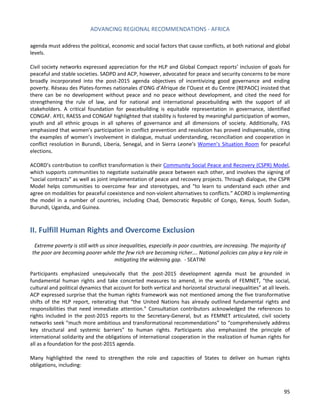
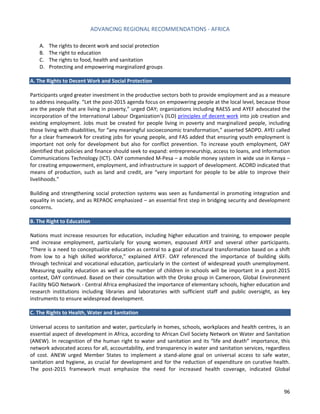
![ADVANCING REGIONAL RECOMMENDATIONS - AFRICA
97
Environment Facility NGO Network - Central Africa, particularly with regard to childbirth, nutrition, and diseases including malaria and HIV/AIDS.
D. Protecting and Empowering Marginalized Groups
Many emphasized the need for the State and other actors to combat discrimination and foster the empowerment of marginalized groups, including: women and girls; youth; Indigenous peoples; people with disabilities; lesbian, gay, bisexual, transgender, queer/questioning and intersex (LGBTQI) people; migrants; people working in the informal sector; small-scale farmers; fisherfolk; unemployed people; people living in urban poverty; survivors of gender-based violence, and other groups who face discrimination.
Gender equality and the rights of women
Gender equality and women’s rights arose as a focus from many respondents. Several networks commended the HLP for its commitment to gender equality and women’s rights as expressed in its standalone goal on gender equality. FAS and FEMNET advocated that the post-2015 framework, in addition to the standalone goal, should incorporate gender equality targets and indicators throughout the goals, and address interlinkages within the accompanying narrative.
AYEF and others stressed the need to infuse a rights-based approach into the language around women’s employment. Merely promoting the incorporation of women into the formal, wage-earning economy for the sake of growth instrumentalizes them, this network asserted. Instead, civil society networks argued, the post- 2015 agenda should emphasize women’s rights by addressing exploitative labour conditions while advocating for increased formal employment of women.
Respondents including Presentation Novitiate for Africa welcomed targets on limiting violence against women and girls but pushed for zero tolerance as recommended by the HLP and SDSN reports, rather than the Global Compact report’s proposed target to halve the number of violent acts, in recognition of women’s and girls’ human rights to live free of violence.
A rights-based approach to gender equality also requires ensuring women’s access to land and resources, as FAS identified: “Particularly in the context of increased foreign and national investment in resources in Africa, the target to increase the share of women with secure rights to land and property should be elevated above that of business.” FAS cited the statistic that in Africa as a whole, “Women produce 60 to 80% of food, but own not even 2% of land”; the post-2015 agenda should therefore incorporate women’s right to access land and loans, as a significant contributor to the development of the agricultural sector.
Women’s unpaid care work must be comprehensively addressed by the post-2015 development agenda, asserted consultation contributors. FEMNET wrote: “It is impossible to achieve a transformational development until economic policy […] recognizes the importance of care economy and how it contributes to the ‘productive’ economy.” FEMNET specified that the post-2015 framework should recognize, reduce, and redistribute unpaid work between men and women, in part through reinforcing the responsibility of States to invest in social services including child care, elder care, and healthcare.
Within the discussions of gender equality as it pertains to health, FEMNET underscored that sexual and reproductive health and rights (SRHR) must be guaranteed in order to “address an important structural barrier to gender equality.” While appreciating the references within the HLP and SDSN reports to SRHR, FEMNET](https://image.slidesharecdn.com/advancingregionalrecommendationsonthepost2015developmentagenda1-141205215235-conversion-gate02/85/Advancing-regional-recommendations-on-the-post-2015-development-agenda-1-97-320.jpg)
![ADVANCING REGIONAL RECOMMENDATIONS - AFRICA
98
recommended adding a target to guarantee services, including to adolescents, and identifying specific measures to achieve this target. AYEF added that States should contribute more to social infrastructure including education and healthcare, to “ensure youth […] have control over their sexual and reproductive health and rights.”
Empowering youth
AYP called for the post-2015 development agenda to address the unique perspectives and rights of youth in a similar manner to the way it addresses gender equality, recommending the creation of a UN body on youth along the lines of UN Women. OAY quoted the Special Advisor of the UN Secretary-General on Post- 2015 Development Planning, Amina J. Mohammed, as saying that young people will be the main beneficiaries and the implementers of the post-2015 agenda, asserting that therefore youth should be incorporated into the levels of leadership. For Africa as a region and for the LDCs as a group, AYEI recommended the development of a youth engagement plan for post-2015, while Dynamique OSCAF called for increasing the capacity of young people to claim their rights. AYP referred to the African Youth Charter, a document of the African Union undergoing ratification by African States, which promotes the rights of young people on the African continent, and “gives direction for youth empowerment and development at continental, regional and national levels.”
Indigenous peoples’ rights
Presentation Novitiate for Africa called for the post-2015 agenda to enshrine the right to self-determination of Indigenous peoples, as well as collective rights to land, territories and resources as agreed under the UN Declaration on the Rights of Indigenous Peoples. Legislature and institutional mechanisms must be put in place, respondents asserted, to recognize these indivisible rights.
Rights of persons with disabilities
Persons with disabilities should be directly included in all provisions of the post-2015 framework that deal with inequality, stated SADPD, and the agenda should mainstream disability across its indicators. Referring to the concept in the HLP report of “Leave no one behind,” this group and several others called for legislation to protect people with disabilities from discrimination and exclusion, along the lines of the UN Convention on the Rights of Persons with Disabilities, the African Disability Protocol, and other relevant instruments.
Equal rights amongst ethnic groups
In view of the challenge of ethnic tensions within many countries on the continent, CONGAF proposed the establishment of monitoring processes to help ensure that different ethnic groups are fairly represented in the different spheres of government and the State.
III. Ensure Equitable Distribution and Safe Use of Natural Resources
African civil society networks expressed particular concern about the increasingly unsustainable and inequitable exploitation of the continent’s rich reserves of natural resources, particularly by the extractive and agricultural industries. Referring to the profound impacts of climate change, these networks also called for much greater levels of climate finance, to enable countries to address the challenges of climate change mitigation and adaptation. A shift in policies, along with increased follow-through on implementation,](https://image.slidesharecdn.com/advancingregionalrecommendationsonthepost2015developmentagenda1-141205215235-conversion-gate02/85/Advancing-regional-recommendations-on-the-post-2015-development-agenda-1-98-320.jpg)
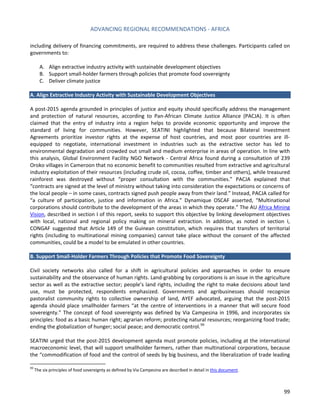
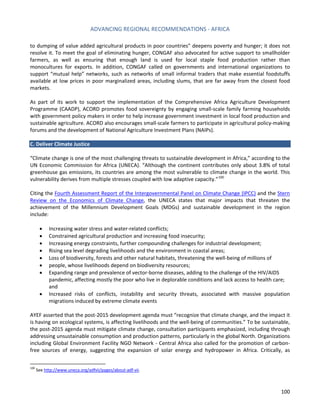
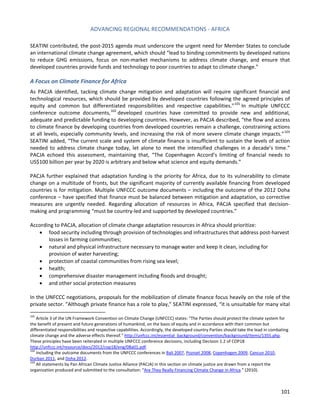
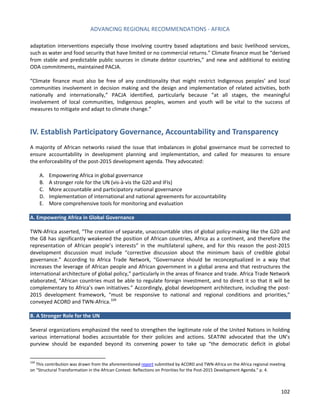
![ADVANCING REGIONAL RECOMMENDATIONS - AFRICA
103
governance.” Africa Trade Network contended that because the World Bank and the IMF are in fact part of the UN system, the UN should be able to subject them to oversight and support regional efforts toward self- defined development. SADPD and SEATINI suggested that the UN’s role should also include enforcing agreed conventions and ensuring accountability at the global level, of governments and of multinational corporations.
C. More Accountable and Participatory National Governance
According to ACORD and TWN-Africa, the post-2015 agenda must be “rooted in a focus on participatory democracy, service delivery, human rights, the accountable use of public resources, social protection of the weak and poor, gender equality and better economic governance.”105 To ensure accountable leadership, “we urgently require capacitated and inclusive national and regional legislative organs [that] take on board the needs of the poor” and enable judicial review and upholding of their rights, asserted SADPD. ACORD pointed to the recently-adopted national constitution of Kenya as a positive example of transparency and a means for citizens to hold their government accountable with regard to recruitment, use of resources, and taxation.
PACJA emphasized that the post-2015 framework must help to ensure participation by “the majority of people, who are the poor people,” in all spheres of governance and decision-making. “The world needs an operational sustainable development framework that can mobilize all key stakeholders,” agreed SEATINI. CONGAF expressed that the needs and perspectives of the people closest to the problems, such as food crises, must influence the agenda beyond consultation. “It is not enough to say inclusiveness,” PACJA insisted; “the onus is also on the decision-makers to build the capacity of people to articulate their issues and participate effectively in decision-making, so that there will be accountability” in the development framework. SADPD echoed, “Poor people should not be only followers in the debate, they have to meaningfully participate in leadership, and also to ensure that the leadership that we have within our countries is accountable to them.”
Referring to civil society participation as a right, RAESS and AYEF asserted that civil society should hold “a place in the formal process, directly engaging with States.” OFADEC emphasized the important role of African civil society in applying their expertise to regional development, and FAS and ACP pointed toward the need for an appropriate enabling environment for civil society participation to help ensure accountability. FEMNET commended the HLP’s recognition of the importance of civil society participation in the “designing, realizing, and monitoring of the post-2015 development agenda” and called for the inclusion of women and women’s movements in consultations and in the agenda itself. Women must also participate in decision-making processes, FAS added, identifying that the “severe lack of women’s involvement in decision-making processes” must be corrected to enable good governance.
D. Implementation of International and National Instruments for Accountability
The post-2015 development framework should employ existing international and national agreements to “ensure that we move the agenda forward toward implementation rather than diluting the language for easy consensus,” stated FAS. Steps toward accountability include making existing mechanisms accessible to people living in poverty (SADPD) and the establishment of a charter to provide a minimum baseline for establishing international contracts (OFADEC).
Some additional mechanisms for holding governments and international actors to account raised by consultation participants include: the Convention on the Elimination of All Forms of Discrimination Against
105 Ibid., p. 3](https://image.slidesharecdn.com/advancingregionalrecommendationsonthepost2015developmentagenda1-141205215235-conversion-gate02/85/Advancing-regional-recommendations-on-the-post-2015-development-agenda-1-103-320.jpg)
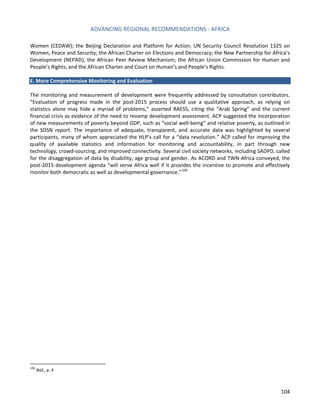
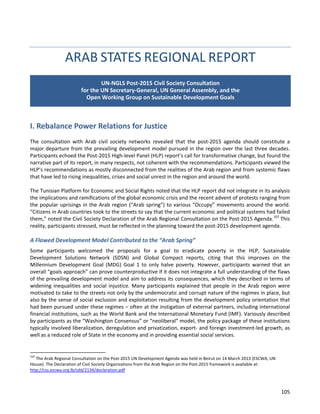
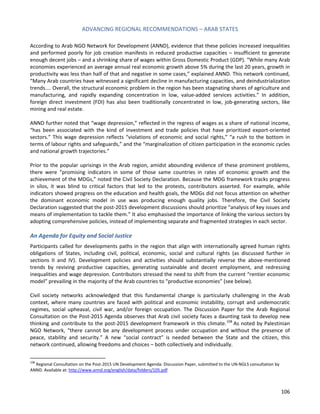
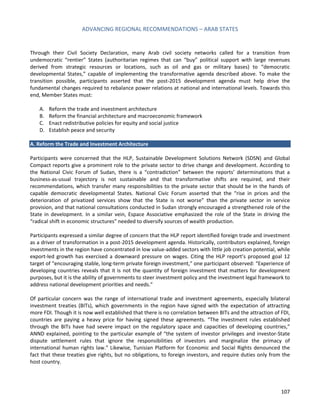
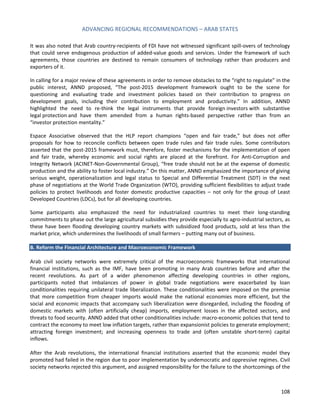
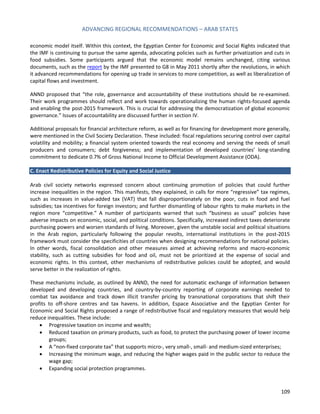
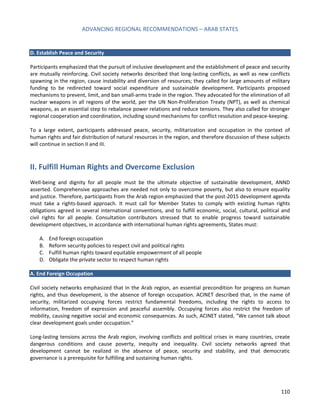
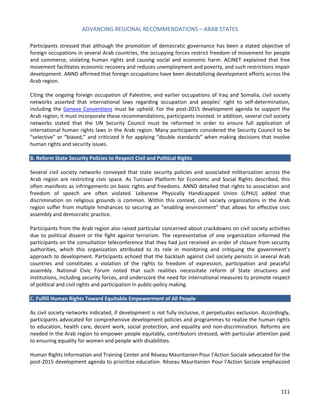
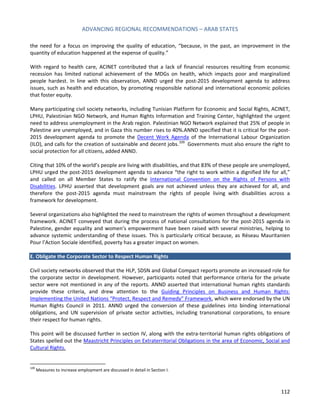
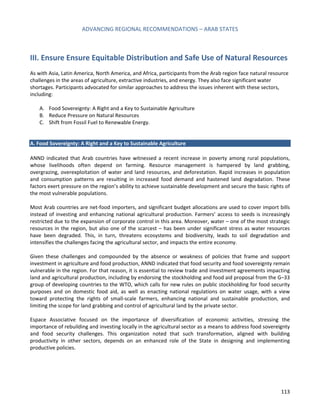
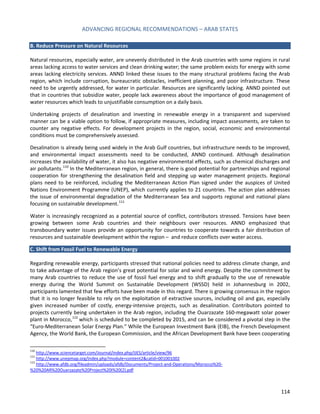
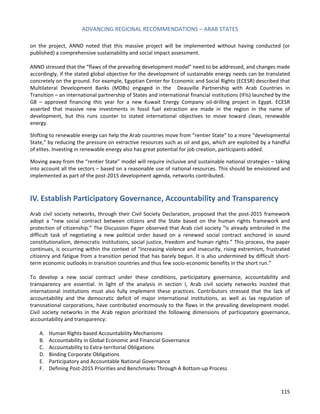
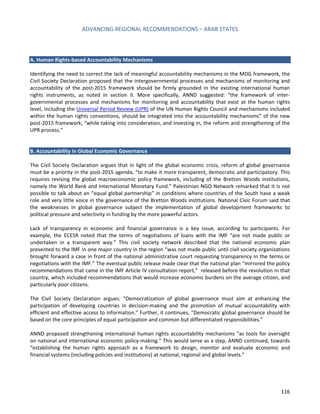
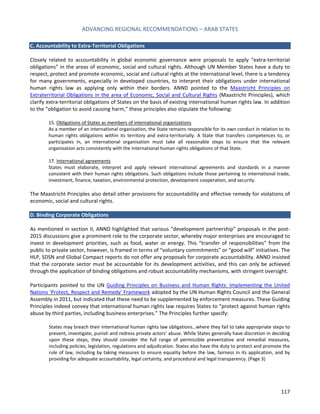
![ADVANCING REGIONAL RECOMMENDATIONS – ARAB STATES
118
Citing that “the risk of gross human rights abuses is heightened in conflict-affected areas,” the Guiding Principles on Business and Human Rights also puts the onus on States to “help ensure that business enterprises operating in those contexts are not involved in such abuses.” Recommended measures include:
(a) Engaging at the earliest stage possible with business enterprises to help them identify, prevent and mitigate the human rights-related risks of their activities and business relationships;
(b) Providing adequate assistance to business enterprises to assess and address the heightened risks of abuses, paying special attention to both gender-based and sexual violence;
(c) Denying access to public support and services for a business enterprise that is involved with gross human rights abuses and refuses to cooperate in addressing the situation;
(d) Ensuring that their current policies, legislation, regulations and enforcement measures are effective in addressing the risk of business involvement in gross human rights abuses. (Pages 8-9)
E. Participatory and Accountable National Governance
Participants discussed at length the complex process of developing participatory and accountable national governance in the politically unstable context of the region. The Human Rights Information and Training Centre stated, “We must reform the system of participatory governance to bring more political stability and security and prepare the region to move into a new phase. We must develop strong systems to fight corruption, promote transparency and equal opportunities.” Espace Associative added, “There should be on-going accountability. Accountability cannot be left to the electoral process alone, where we have to wait for five or six years to hold our leaders accountable.” Accordingly, Espace Associative underlined the need to elaborate the concept of “democratic participatory governance” to include solidarity movements, and to allow continuous questioning of governments to hold them accountable.
The Civil Society Declaration noted: “As the popular unrest that has swept cities, globally, indicates, citizens and civil society are demanding their right to participate at all levels of decision-making. This entails the recognition of civil society as a key partner in identifying issues, policies and goals and in the implementation of the agendas.” Specifically, the Declaration advocated “mainstreaming participatory processes at various levels of policy-making including the provision of access to information and other channels. In turn, this implies an overhaul of current systems of governance. Clear mechanisms for implementing such policies with benchmarks for their measurement and achievement must be part of the new development framework.”
Under the conditions of social instability that prevail in many parts of the region, the Civil Society Declaration calls for the implementation of “transitional justice mechanisms” to maintain social cohesion where needed.
F. Defining Post-2015 Priorities and Benchmarks Through a Bottom-up Process
The Civil Society Declaration called for a “bottom-up” approach for framing the post-2015 agenda: “The post- 2015 process should be participatory, multilateral and inclusive of all involved in promoting development. Developing countries […] should have a similar pro-active engagement as that of industrialized countries.” While the process should be inter-governmental, the Declaration continued, it should involve all stakeholders and “address the demands of civil society in a sound and comprehensive manner.”
Many participants called for indicators that go well beyond simple measures of income, and to adopt qualitative indicators rather than relying solely on quantitative indicators. ANND suggested that the work of the human rights bodies and the Office of the High Commissioner for Human Rights (OHCHR) on indicators and](https://image.slidesharecdn.com/advancingregionalrecommendationsonthepost2015developmentagenda1-141205215235-conversion-gate02/85/Advancing-regional-recommendations-on-the-post-2015-development-agenda-1-118-320.jpg)
